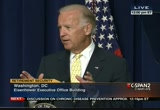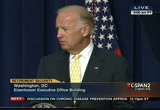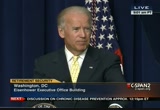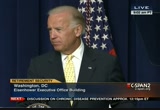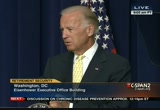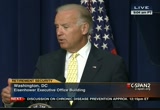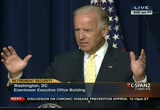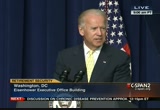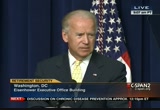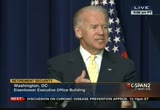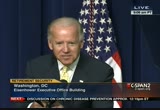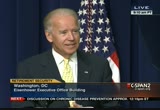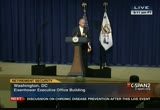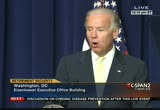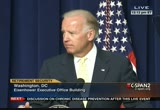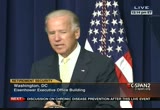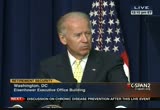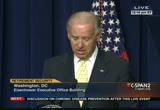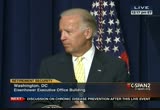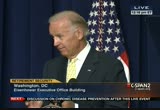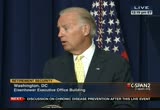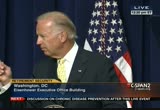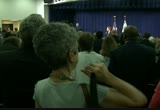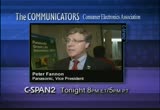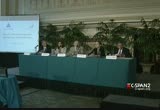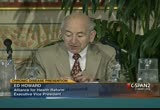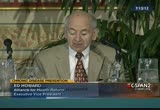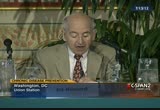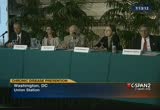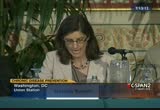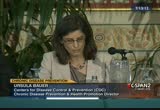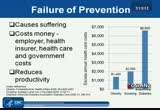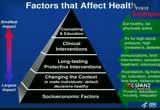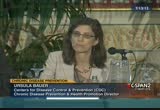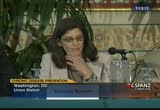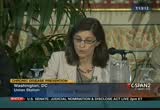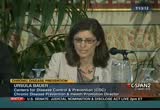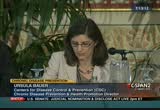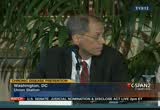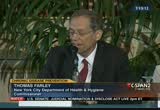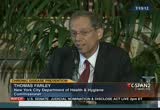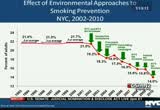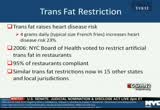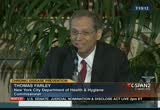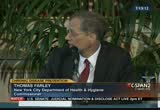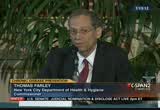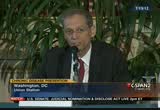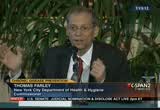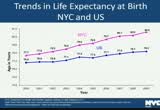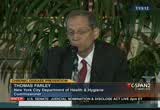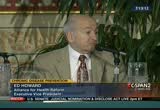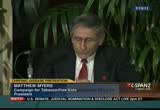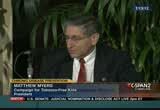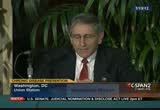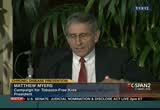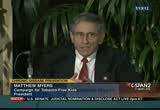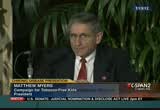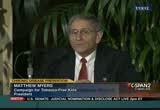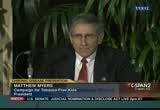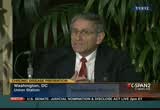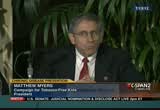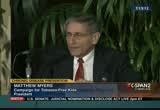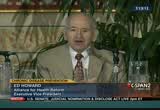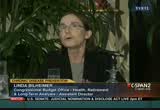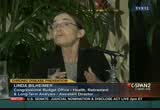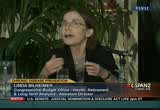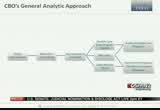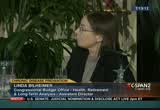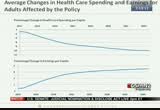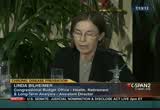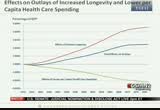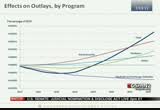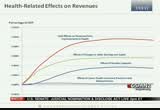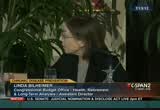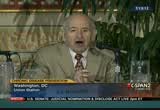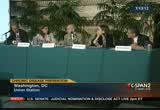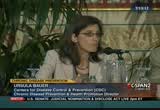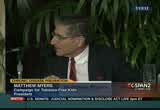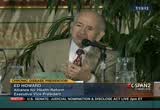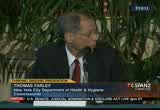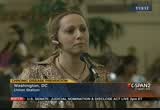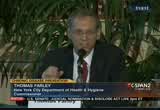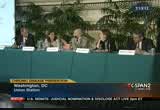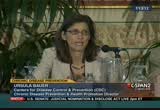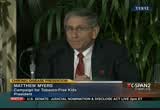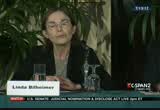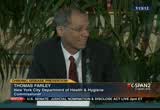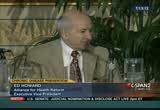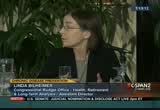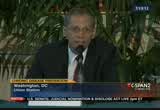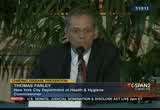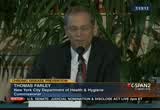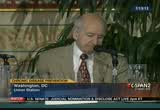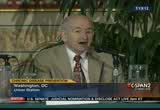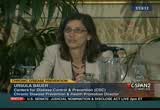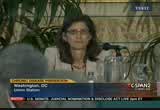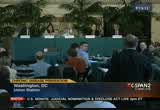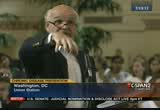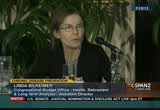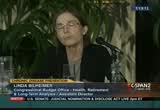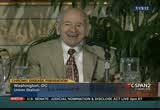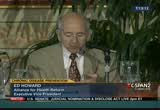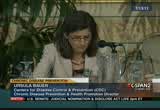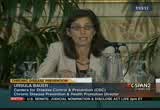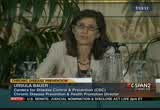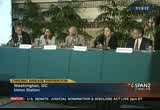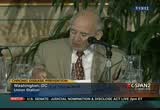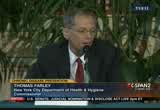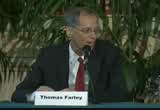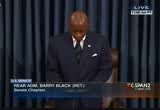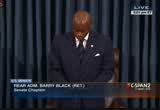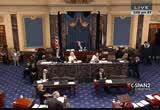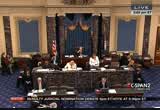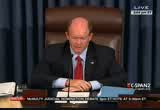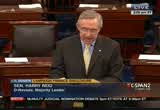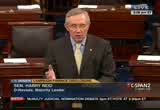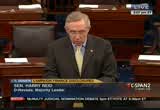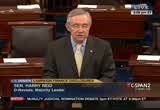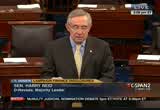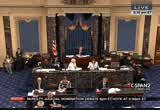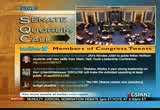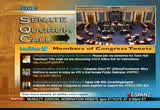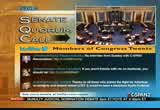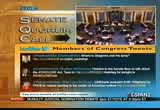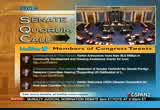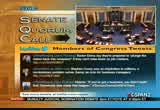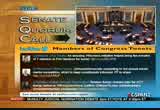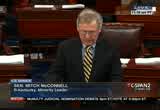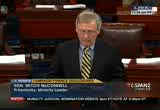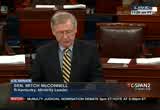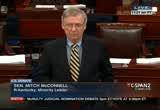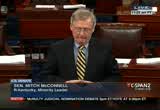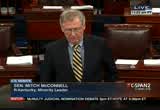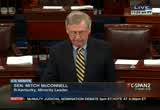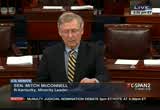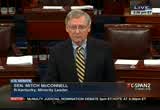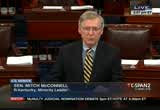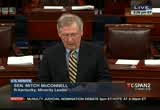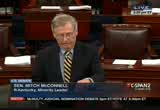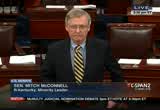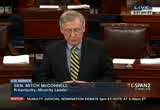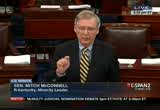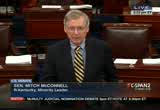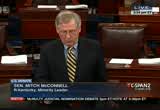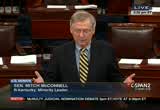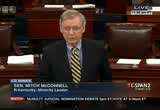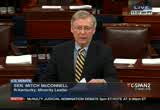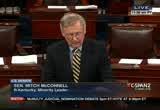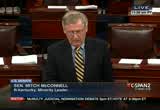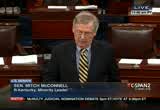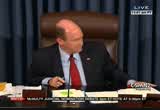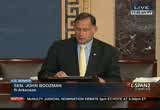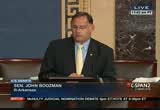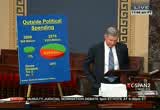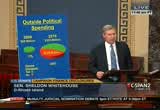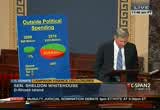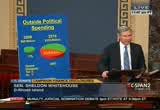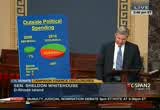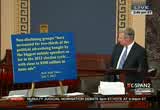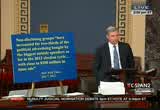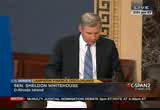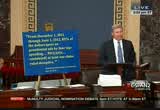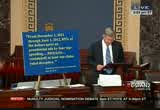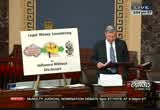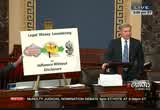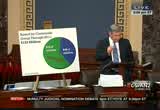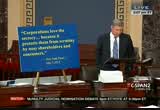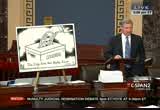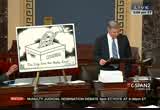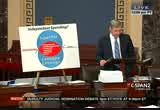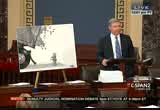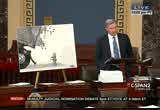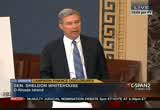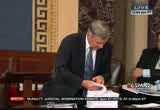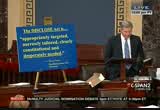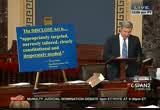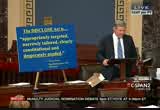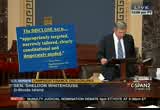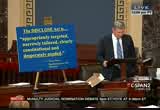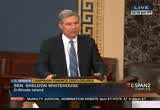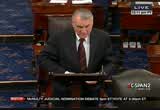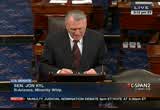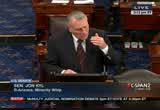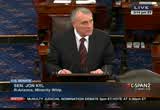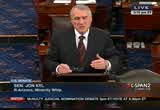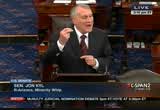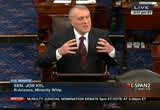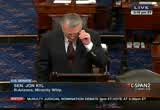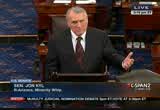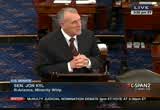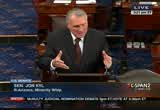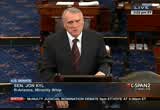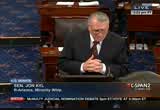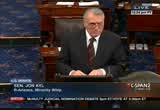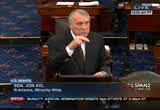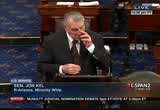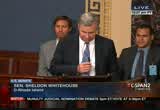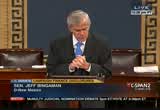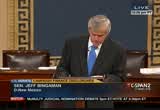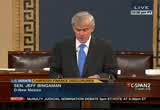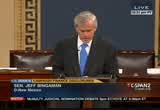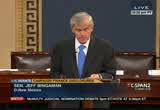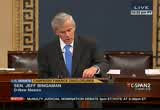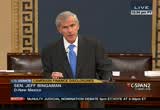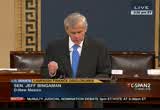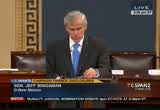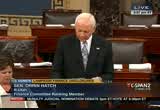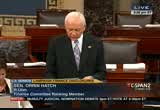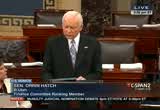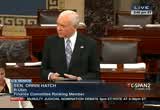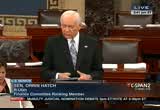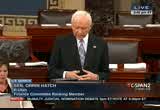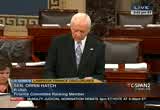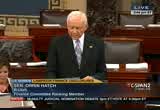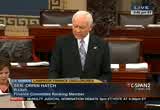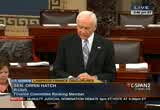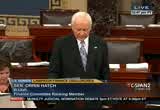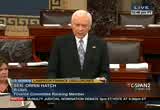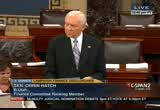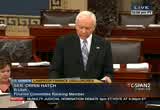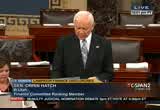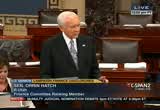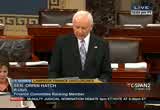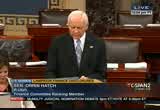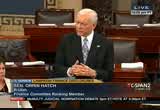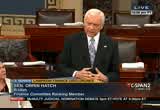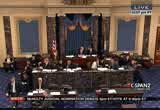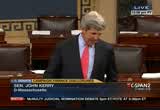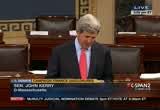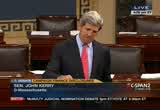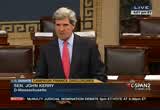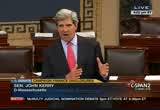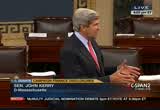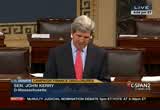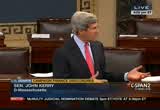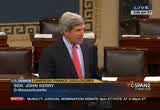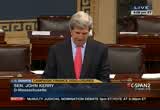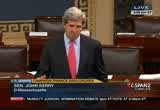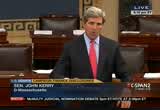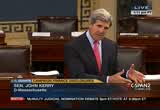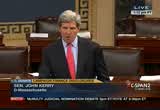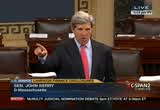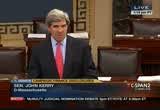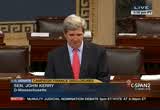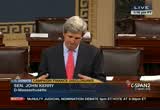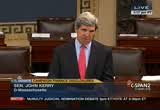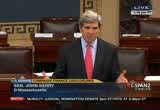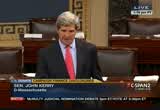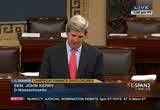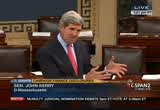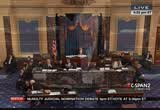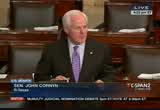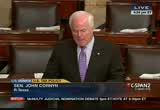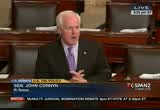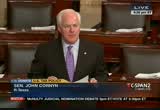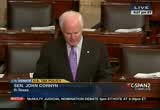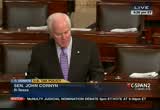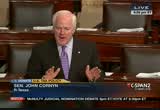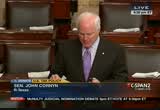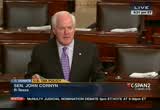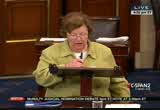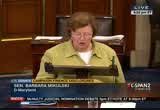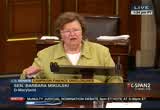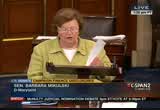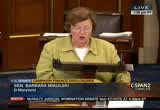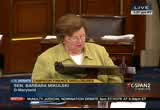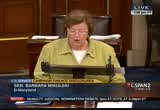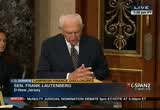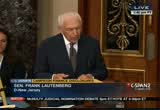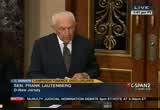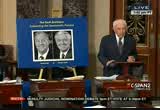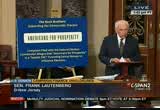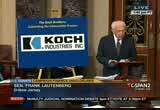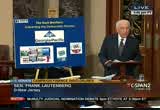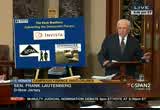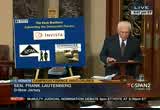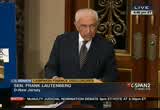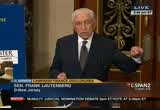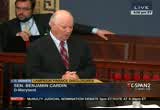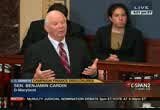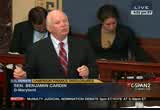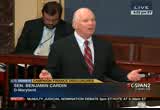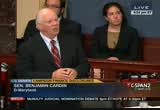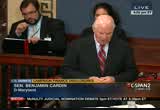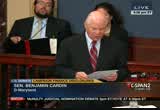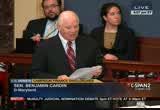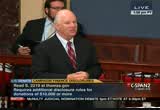tv U.S. Senate CSPAN July 16, 2012 12:00pm-5:00pm EDT
12:00 pm
vulnerable of the seniors on medicare, the so-called dual eligibles. but we need real partners. we need real partners on the other side to get it done. i've been here a long time. i was a senator, i got elected by 29 years old. elected seven times in the senate. vice president. i've never quite seen it this way before. worthy of destruction is so endemic -- where the destruction is so endemic in terms of the process. but we are prepared to sit down and workout with our republican friends, which i started to you as you remember, that biden committee were we met for 40 hours with the leaders, appointed leaders by the house leaders and senate leaders, democrat and republican. there's nothing easy about it
12:01 pm
but there are solutions that can save the program. programs. but we need to start from the premise that medicare, as we know it, is preserved your that's the premise we are not prepared to yield on. [applause] >> unfortnuately, the other side has staked out a very different position. and by the way, these are decent, honorable men and women. i'm not playing a game. these guys are bad guys. they just have a different value set as to what is the most important thing that we should be doing. just look at congressman ryan, bright, bright guy, phenomenal man. is budget, which has been embraced by i believe every member in the republican side and the house of representatives. you might remember the first
12:02 pm
ryan budget last year, there was nothing subtle about it. it dismantle medicare and would've turned into a voucher program over a ten-year period. independent report found that out of pocket health care cost for the typical 65 year-old would have doubled. that's $6400 a year more than being paid now. again, my mom and dad had four kids who could help. but that's all my mom and dad had. they had no -- my dad worked his whole life, pension did not exist. social security and medicare, and putting for kids to college and graduate school. were the legacies. another $650 matters.
12:03 pm
you also probably remember that this plan was overwhelmingly rejected by the american people. it passed every house member vote. didn't get through the senate. and you all started talking about it, and the public, overwhelmingly rejected a. they said how did you know that? well, they didn't come back with the same plan this year. they got a new one. this year they came back with one that is more subtle. that it really didn't change. it didn't change the core of what they want to do. they are still pushing medicare vouchers. it's a plan that would still mean higher costs for almost everyone who depends on medicare. and that goes for medicaid, do. folks, you know how important this program is to seniors. medicaid pays 40% of the long-term care spending in this country. not only by bringing peace of mind to seniors, but to the children and grandchildren as
12:04 pm
well who otherwise would have the burden. and if i could digress for just one second, the vast majority of folks in long-term care are women. and the overwhelming majority depend on and are there only because of medicare. 5 million seniors who can't carry their medicare premiums or cost-sharing on their own to get the health care they need. house republicans propose cutting the funding by more than a third. taking away 19 million, taking 19 million americans on medicare off the rolls. 19 million. why? because they want, they have other priorities.
12:05 pm
and there he believes that these other cars have promoted, the whole economy and everything will be better and everything will grow. i'm not sure how it's going to seniors immediately, but that's the thesis. and what's it based upon? well, it starts off with insisting on extending the tax cuts for people, not just, primary for people making over a million dollars. it cost $800 billion to keep the bush tax cuts, just for people making over a million. i want to put this in perspective. of the total trillion dollar cost of the entire bush tax cut for people making over 250, do you know how much of that goes to 120,000 families in america? $550 billion. the 120 families. let me say this again.
12:06 pm
maintaining the top tier tax-cut cost over 10 years a trillion dollars. maintaining for just people making a million or more costs 800 billion of that. maintaining it for people with an average income of $8.4 million a year, which comes out to be 120,000 families in america, costs $550 billion over the next 10 years. that's a fact. they have made a clear choice, lower the standard of living for those on medicare and medicaid, rather than ask anything of the wealthiest among us. and by the way, i come from a wealthy state of delaware. i think has the highest per capita still. the wealthy in my state are as patriotic as caring as the poor.
12:07 pm
i have never seen any distinction between patriotism or generosity come from poor folk and the wealthy guy. but we are not asking anything of them. they are the only group in this entire recession we have not asked anything of. we launched two wars, one necessary, one not necessary. and on the way, the same time gave him multi-trillion dollars tax cut over the same period of time. i don't get it. and on top of maintaining the bush tax cut, and we want to maintain it for middle-class people, on top of that, and on top of what it will do to all the other benefits of seniors have, that they want to undo, the house republicans voted to repeal the health care law last week.
12:08 pm
let's not forget what that means. but they voted against. let me go back to taxes for just a second. there is the 800 billion that is set aside over here for people, the million dollars or more, of the 550 billion to 120,000 families. in addition, paul ryan introduced a new budget which calls for an additional $2 trillion in tax cuts, almost $2 trillion in tax cuts over the next 10 years for people who make an average, a minimum of a million dollars. so over the next 10 years we are going to spend 2 trillion, roughly $2,800,000,000,000 on people who make over a million dollars, because their tax burden and apparently is too high.
12:09 pm
so you wonder, how could these guys come out with a ryan budget. i mean, it doesn't seem logical, does it? well, they are honest guys. they've got you. they've got to eviscerate everything else to come up with another $2,800,000,000,000. and with the health care law that they voted to repeal, our health care law close the doughnut hole for 5.3 million individuals. medicare, in the medicare doughnut hole. saving those folks those 5.3 million, $600 a year already on their prescription drugs. and our health care law provides more preventative services, checkups, bone mass measurement, mammograms. which you now have to pay for. you have to pay for, but no co-pay. we want to keep you healthy. it makes sense long-term.
12:10 pm
it costs the government less money to make sure you go in when you feel something when you have something you're worried about, and get it taken care of front and that it does waiting until it happens. they want to repeal all of it. folks, we would be much better off if we spent a lot less energy fighting off, medicare, medicaid, get rid of the affordable health care act, more time working to figure out how to provide better health for the american people, and preserve medicare and medicaid. we all have to make tough decisions to do that. but look, they have the same deal on social security. it doesn't affect you all. they will come back and say they did a generation thing in reverse this done. oh, don't worry, we're not going to affect anybody on medicare now, on social security. and they are right. they're not going to do that. but guess who they do? they've got this great idea,
12:11 pm
republicans have come up with, come up with another approach for social security that they claim save social security, solely though by cutting benefits. what do they do? what they do is they say somebody who is now 42 years old, or 45 years old, we're going to cut your social security. so when it comes time for you to get, you ain't getting anything like what your parents got. that's how they are going to save. so love how they do this shell and bp game. don't worry, you should not worry about how you do. you should be for these changes because corn to preserve you but it will really nailed your kids. i'm serious. that's the reality. i know of a bad reputation, speaking plainly. [laughter] i'm going to continue to speak plainly. it served me well my whole life. [applause] i don't like people who don't
12:12 pm
speak plainly to me. i don't understand -- actually i do understand them. so folks, we can resolve the challenges of social security. and we can do it in good faith. i did it before. i was part of a relatively small group back in 1993, as a u.s. senator that extended the life of social security well into the 20th century, the 21st century. social security as about to run out of money. so we sat down. we worked with republican leaders, bob dole, my colleague from delaware, conservative as can be but a great friend, chairman of the finance committee. ronald reagan, tip o'neill, pat moynihan. and we literally sat down, together and separately, in smaller groups here and we made what was a difficult decision.
12:13 pm
people didn't like the nobody wants any change. we said gradually, months over years, you're not going to be able to retire at 65. very, very, very, very unpopular decisions. nobody wanted a change. except we knew it had to be done. so what did we do? we joined hands, never forget what bob dole after getting up from immediate he said, he a great sense of humor. he still does. he said with all got to get out. he stood up from his chair and, we've all got to get up and put one foot together in a rowboat at the same time. and then altogether put two feet in so it doesn't to it. so we are all in the boat together. getting in that boat together with leaders like reagan and o'neill, what did we do? we preserve the system. [applause] preserved the system.
12:14 pm
again, this conversation we're having here, nobody is saying there are easy answers to this. any of you go there's a problem, keep everything, you're wrong. you are wrong. but there are solutions. and democracy solutions come when people of good faith wanting to resolve and save a specific thing, make our decisions. but when one team says let's preserve any other team says let's basically get rid of it, do something different, there's not much room to compromise. look folks, you know in your gut what i know. it's about putting politics against -- it's about putting the country and the seniors up against your political interests. just for a moment, to preserve one of the most significant
12:15 pm
government initiatives in history of the united states of america, and that's what we need today. that's what's missing this time. today, our republican friends are fixated on one thing, additional tax cuts for the wealthy. they won't budge an inch on this but they have a very different values as i do. my father said don't tell you what you buy, show me your budget and i will tell you what you valley. and with the valley is different than what my team values. that's not to say they don't care about the elderly. i believe they do. they just have a different way. but it's always basically been this way. they have never initiated any of these changes we are trying to preserve. folks, it's simple math. you either preserve medicare and medicaid, fix social security and draw down the deficit, or you spend another several trillion dollars in tax cuts for
12:16 pm
the wealthy and you make nearly, and can make more room for another $2 trillion tax cut proposed by congressman ryan, and his republican colleagues. but you can't do both. you can't do both now. the president and i refuse to shift the burden, particularly of this got off a recession we have, on the backs of the people who work so darned hard their whole life, who earn their retirement, and had nothing to do with this collapse that we inherited in the economy. nothing. but now the other side argues that cutting is the only way to save the programs for the next generation. as i said, they just don't understand. they just don't understand. that retirement is multi-generational. as i said, it matters to you. it matters to your children. it matters to your grandchildren, because if you don't go, they won't step up. i'll tell you one store in
12:17 pm
conclusion. my mom was a very proud lady, and mom, god love her, was in great health to the very end. and my mom moved in with us and she actually moved in, there was a piece of property that had a little tiny part on a. i become it was like a big garage and it was at the top of the driver. and i sort of, my brother said gingerbread it a bit i put nicer doors on a, shutters on the windows were didn't look like an old dilapidated barn when you walk in. couldn't get my mom to move in with us, even though the whole downstairs i built for my mom and dad. it was a walkout. it was glass looked out on a nice view, and she would moving. taken after my dad died there. she said, she just wasn't going to do it. so when they were walking, driving down around christmas time, chile, build me a house there. a cottage. i said mom, you know i don't have any money to build a cottage, honey. i built the house. she said no, sell my house and you go ahead and build a house
12:18 pm
right there for me. a little cottage. the humorous part was, by the way, i decided this great little cottage with one bed in the so i had the architect coming with me and laid out on the dining room table. she only has one bedroom to it. i said well honey, if there's something want to tell me about? i don't know -- is this something you want to tell me that i don't know? she said no, when my children and greg rentschler i want to stay with us. mom, it's 500 feet to the house, i've got five bedrooms. she said joey, they are not my bedrooms. the generic point is my mom drove until the very end, and so she used to go up to what used to be called happy harry's, a change of drugstores. now it's walgreens. so my sister suspected that mom -- unit anyway who's a senior senior that doesn't have come especially an octogenarian over 85 who doesn't have six, seven,
12:19 pm
eight prescriptions they take, and for a child, it's one of the hardest things to do is make sure they get it right. and so, my sister, valerie who is smarter than i am, she said joey, i don't think mom is getting all her prescriptions. so i followed her up one day. this is before i got elected and had a secret service team. i followed, only about a mile and a half, and i went to happy harry's and as a blood pressure machine. the blood pressure machine at the as i sort of hid behind a blood pressure machine because people were lined up to get their prescriptions at the window, the pickup window. and is a beautiful lady, beautiful personality, the drug is better. and what happened is my mom went up, and she got like the deck of cards, handed all these prescription. she said i don't need this one, and he. i need this one. my mother was ashamed to tell me. i could easily afford, my sister
12:20 pm
could easily afford. my brothers could easily afford, and we all did. mom was too proud. too proud to say i'm short getting this prescription. that's why this country is so great. because people with pride and dignity like my mother. that's what made this country. and the idea, at the end of their lives, we are going to do this. is beyond my comprehension. we need your help. you all have impact in your communities. you are part to large organizations, and some not so large. please go out, as they say, as i say, speak plainly, speak plainly. to the people you know.
12:21 pm
you influenced people. they respect you. it's not just the organization. he wouldn't be here if you want leaders. we've got to go out. and make this a fight. some things are worth fighting for, folks. this is worth fighting for. god love you all. thank you very much. [applause] you saw vice president joe biden in the eisenhower executive office building. sometimes referred to as the old executive office building next
12:22 pm
to the white house. if you missed any of this, you can find it on a website, c-span.org. coming up later today the u.s. senate gavels in to start the week. general speeches up first with work string to a judicial nomination at 5:00 eastern. lawmakers will vote to confirm the nominee a half hour later. meanwhile, on c-span today the wilson center is hosting a discussion on the situation in syria, and the continuing violence in that country. that discussion underway, got underway about 20 minutes ago. later a look at voter security from a forum hosted by the brookings institution. it gets underway live at 2 p.m. eastern also on c-span.
12:23 pm
>> pandora is a personalized internet radio. >> has a very wide range array of products. you can think of it and on glue goes. you think plastic, you run it through a heater and then you get into the heater and layer by layer, it builds up. >> a look at the latest in technology and tech devices from a consumer electronics association technology fear on capitol hill, tonight at 8 p.m. eastern on "the communicators" on c-span2. >> next, the alliance for health reform hosted a discussion on chronic disease prevention and the link between rising health care costs and chronic disease. according to an alliance for health reform report, health care spending or obese adults is 56% higher than normal weight adults. this translates into spending more money on preventable diseases like heart disease and diabetes. the discussion focused on public health care investments, wondering whether they lead to reduced health care costs.
12:24 pm
members include the cdc's chronic disease prevention director, new york city's health and hygiene commissioner, and the congressional budget office health analysis assistant director. this is an hour 45 minutes. >> its impact on america's health, what's being done about it both nationally and in communities around the country. very quickly, there is a national epidemic of chronic disease that attacks 130 million americans, costs 70% of the deaths and accounts for 75% of spending. now, those kinds of numbers attract attention, even in a town like this would've billions have lost favor to trillions. and congress was listening to those numbers when it passed the health reform law, several parts of that law speak directly to the problem of chronic disease. but well before that reform was
12:25 pm
enacted, communities around the country were beginning to address areas such as tobacco use and obesity, the need for more physical activity, as a way to improve the health of their population. we call today's session on a disease prevention, saving lives, saving money, and we're going to hear from folks who can help us understand what can be done, to lessen chronic disease in our population, what is being done, and what the impact of those steps is. what's more, we're going to look as closely as any reading we have ever done, has -- after long-term fiscal implications of an illustrative step towards lowering chronic disease. fortunately, our panelists are very well equipped to help us examine these berries initiatives, and promise that they may hold. now, our partner in sponsoring this briefing is robert wood johnson foundation, the nation's
12:26 pm
largest philanthropy devoted exclusively to, every member the tagline correctly, helping americans enjoy healthier lives and get the care they need. i want to thank jim marks at the foundation who couldn't join us today, and his colleagues for their help in pulling this program together. couple of logistic items before we get to the speakers. in your package you will find important information, including speaker bios, and the hard copies of the powerpoint slides that you see on the screen. there's also a lot more background information available. and that is all available also on the alliance website at all health organ function.org -- allhealth.org will be a webcast of this briefing sometime probably monday on the kaiser family foundation website,
12:27 pm
eff.org. c-span is also recording the briefing, not airing it live. you can watch for the schedule to see when it will be broadcast. and if you happen to be watching the recording on c-span right now, you can find more resources on our website, including the slightly you can follow along. at the appropriate time, please fill out that green question card and we will give our panelists a chance to answer it, and the evaluation form before you leave will help us to improve these programs as we go along. now, we have assembled an incredibly knowledgeable group of panelists today with both national and community level experience. they're going to give brief presentations, and then you have a chance to join our conversation directly. we're going to start with doctor ursula bauer. she's the director of the national center for chronic disease prevention and health
12:28 pm
promotion within the centers for disease control and prevention. she's an epidemiologist with a long background in public health at both the state and national levels, and she's in charge of strategizing to pursue her centers the goals of preventing tobacco use, improving nutrition, and promoting physical activity. dr. bauer, thank you so much for joining us, and let me turn it over to you. >> thank you very much, ed, and good afternoon, everyone. as you know, and you just heard on ed, chronic disease continues to be a major problem for the united states, even as we are making real progress in reducing rates of heart disease and cancer, which are the leading killers. chronic diseases are responsible of seven of every 10 deaths in the u.s., flight 130-140 million americans. many of whom are living with two or more chronic conditions. and they are being diagnosed at
12:29 pm
younger and younger ages. chronic conditions including heart disease, diabetes and arthritis cause major limitations for nearly one out of 10 americans. and account for 75% of our more than two and a half trillion dollars that the u.s. spends every year on medical care. importantly chronic diseases are largely preventable. it's hard to find a chronic disease that's not caused by, exacerbated by, or negatively impacted by one or more of three primary risk factors come tobacco use, poor nutrition and physical inactivity. improving these behavioral risk factors would go a long way toward preventing or mitigating the suffering, disability, and premature death associated with tonic diseases. effective prevention can reduce
12:30 pm
or eliminate these risk factors, can detect diseases early and a bird progression or complications, and constitute a best buy for the american people. our evidence-based prevention strategies are cost effective, and sometimes even cost-saving. when prevention fails, that is, when we failed to do what we know works to prevent disease and promote health, we cause needless suffering and premature death. ..
12:31 pm
where we live and work and the access that we have to quality health care. at cdc, when we look at opportunities to intervene to prevent disease and promote health we focus on the second level of this pyramid. changing the context, that is, putting health in the people's hands and supporting people in taking charge of their health. whether it's opportunities to breathe air that's free from tobacco smoke, having safe places to be physically active, choosing healthy food options in our restaurants, schools, grocery stores and work places, or protecting ourselves and our children from dental care and oral disease and tooth loss that our grandparents and great grandparents experienced.
12:32 pm
public health interventions that change the context and make healthy choices easy for americans, reach the greatest number of people and can have the largest impact. these interventions are often the least costly as well and they're certainly cheaper and more cost effective than clinical interventions and counseling and education. however i want to emphasize that the steps in this pyramid are not in competition with each other. work in all of these areas is needed to insure that all americans have the opportunity to be and stay healthy across the lifespan. at the national center for chronic disease prevention and health promotion our role or what we do is listed on the left side of this slide. how we do it is on the right and that's by working in
12:33 pm
four key domains. epidemiology and surveillance is the foundation of cda's work. we provide data and information to develop and deploy effective interventions, identify and address gaps in program delivery and monitor our progress in achieving program goals. data and information come with the responsibility to use it well. we engage in health communication and insure that decision-makers have the information they need to make the best decisions and publicize widely the results of our work to demonstrate the return on investment in prevention. environmental approaches, transform the community context in which health occurs to make healthy behaviors easier and more convenient for americans. healthy communities deliver healthier students to our schools. healthier workers to our businesses and our employers
12:34 pm
and a healthier pop to the health care -- population to the health care system. these preventions have wide reach and sustained impact and offer only require modest resources to accomplish making them high impact. as i said a best buy for public health and the american people. health systems work improves the clinical environment to more effectively deliver quality preventative services and help americans more effectively use and benefit from those services. the result, some chronic diseases and conditions will be avoided completely and others will be detected early or managed better to avert complications and improve health outcomes. innovations like electronic health records, systems that prompt clinicians and deliver feedback on performance and requirements for reporting outcomes such
12:35 pm
as control of high blood pressure and the proportion of the patient population that is up-to-date on cancer screenings can be very motivating to providers and health insurers to focus on these preventative services. effective outreach to consumers, to increase effective use of, for these services is also key. as availability of coverage alone will not maximize the effective use of preventative services and the associated health benefits. community clinical linkages, help insure that people have access to community resources and support to manage chronic conditions once they occur. clinician referral, community delivery and third party payment for effective programs like the national diabetes prevention program and a variety of self-management programs for arthritis, for heart disease,
12:36 pm
and more increase the likelihood that people living with chronic illnesses will be able to follow the doctor's orders and take charge of their health, improving their quality of life and averting or delaying the onset or progress of progression of disease. avoiding complications and importantly reducing the need for additional health care. by working in these four areas we will reduce obesity and diabetes, further reduce heart disease and stroke, breast and colorectal cancer, poor nutrition, tobacco use and physical inactivity. but we won't do it alone. public health problems require multilevel, multisector solutions, increasing opportunities for health requires working at the national, state and local level and engaging public and private sectors
12:37 pm
beyond health, that bring resources, expertise and solutions to the table and focusing on those cross-cutting risk factors that mentioned and the evidence-based strategies that address multiple chronic conditions simultaneously. working together i think in these areas we will improve health, quality of life, and life expectancy for americans. and we will reduce the need for health care and better control our health care costs. thank you. the. >> thank you very much, ursula. [applause] we're going to turn now to dr. thomas farley. he is commissioner of the new york city department of health and mental hygiene. he is a pediatrician by training. he is also had public health service at both the state and national levels including at the cdc and he's going to share with us
12:38 pm
some of the successful results that new york has achieved in lowering the incidents of chronic conditions. thank you for being with us. >> thank you and good afternoon. i will take you through some examples of ways we in new york city have tried to combat chronic diseases. i emphasize these are not all the things we are doing but i will take you through some of the important ones and some highlights of them and finish with some evidence of the effectiveness of our approaches. these are the things i'm going to go through, interventions that are done in the environmental level or what dr. bauer would refer to as changing the context and specifically smoking prevention, trans fat restriction and sodium reduction. and then a summary of our clinical intervention and that's use of a prevention-oriented electronic health record with quality improvement technical assistance. so let's take smoking first. there have are three major elements to our smoking prevention program in new york city. first is insuring the high price of cigarettes through
12:39 pm
excise taxes. in 2002, when the bloomberg administration came in office the excise tax total on a pack of cigarettes in new york city was $1.58. at that point there was a tax increase in new york city of $1.50 per pack which brought the tax to $3.39, with subsequent increases taxes and state and federal level in 2010. total tax on cigarette tax in new york city is $6.86. meaning price of a pack of cigarettes retail in new york city is $11 which is the highest price in the nation. something we are very proud of. [laughter] the second element of this is having comprehensive smoke-free air laws. 2002 new york city passed a smoke-free air act which the comprehensive act that prohibited smoking in work places especially particular importance with restaurants and bars. this idea spread to other jurisdictions but at that time it was a pretty radical move. the smoke-free air act was
12:40 pm
extended in 2011 to include outdoor, pa and beaches. in 2012, institutional policy the city university of new york will have all 23 campuses in the city completely tobacco co-free. the third major element is use of hard-hitting media messages to warn people about the effects of smoke. this is done graphically showing effect of smoking. using best modern advertising techniques. you're messages are developed in focus groups of smokers and evaluated in surveys. the photos on this slide are from our most recent campaign. in which we recognize that smokers in general are not afraid of dying but they don't want to suffer. so this campaign just to be not terribly subtle about it, called suffering every minute. and it emphasizes how suffering can last a long time. it highlights a person with emphysema and another person with stroke. this is the overall effect
12:41 pm
of our tobacco prevention program over the last 20 years. you see before 2002, smoking prevalence in new york city was around 21% for a decade. since then the percent of adults who smoke has dropped down to 14%. that is more than one-third decrease. that represents 450,000 fewer smokers than we had in 2002. the decline is actually larger than that though because we know that the people who are currently smoking are smoking less than those who were smoking in 2002. so the total cigarette consumption in new york city has fallen by more than 50%. and we also are optimistic about the future because the decline in youth smoking which is not shown on this graph has been even greater. it was about 25% around 2000. now it is 8% in new york city. so, moving on to trans fat reductions, or restriction, we took on trans fat back in around 2005.
12:42 pm
the rationale for this was that trans fat is an artificial chemical which doesn't need to be in our food supply which raises heart disease risk. to give you a feeling for this, a four gram amount of trans fat taken every day, would increase your heart disease risk by 23%. in 2006, the new york city board of health passed a rule that prevented restaurants which we regulate in new york city, from using trans fats in preparing food. that rule is enforced by our restaurant inspections which we do otherwise for general food sanitation purposes. and now we have over 95% of the restaurants are complyant with the rule. the idea of trans fat restrictions was started in new york city has now spread to 15 other jurisdictions around the country. we're also focusing on high levels of sodium consumption. and the rationale for that is this. it's clear we all consume far more sodium and than is good for us. far more sodium than is needed.
12:43 pm
probably at least twice as much. if we reduced our average sodium consumption in the country by 1200 milligrams a day we would probably save 10 of thousands of lives each year in reduced heart disease and stroke. in the past physicians recommended to people adopt low-sodium diets and put less sodium on their food but clear people individually have very little opportunity to make meaningful reductions in the sodium consumption because 80% of the sodium we consume is already in the food when we buy it. it is in packaged food. and restaurant food put in there by a food manufacturer. if we want meaningful reductions at population level we need food manufacturers to put less sodium in their food. that is definitely possible. we found it and now lead what is a national coalition that has been called the national salt reduction initiative and has establishment goal of reef introducing sodium intake by 20% over five years but reducing the sodium content of packaged and processed food by 25% over that time
12:44 pm
period. it is voluntary initiative in which health organizations are working with the food industry to make these reductions. the way that it worked is, as follows. we met over the period of about a year with representatives of major food companies. and through those meetings we divided packaged food into 65 categories or 62 categories i'm sorry and restaurant food into 25 categories. within each category we established a sales weighted mean target reduction for the years 2012 and 2014. with the average reductions being 25% and we put those targets out there and we asked food companies to commit to meeting those targets in their sales weighted averages and so far we have 28 companies who have agreed to meet targets in at least one of those food categories. this is not the entire food industry but there are many major food companies on there. if you look at the list, you
12:45 pm
sea kraft, unilever, some of the true food giants in this country as well as major restaurant chains. later this year we should have reports back from those companies that committed to targets in 2012 to see how well they met their commitments. moving on to clinical preventative services one thing we know that there are a relatively small number of services that can be delivered by physicians or other clinicians that are inexpensive, that are simple, that are proven to be effective at preventing disease over the long term and are not nearly as well-delivered as they ought to be in this country. we have a very expensive health care system that could do far better in delivering these proven preventative services. we have an interest improving those services in new york city. we tried to do this through this project where we established a prevention-oriented electronic health record. we developed a electronic health record with a vendor and deployed it to more than 3,000 providers across the
12:46 pm
city serving three million patients. this is a city of eight million people. so we have a fairly large reach across the city. the features of this electronic health record are many but the ones that are most important what we call dlin call decision support system. what this is a alert shows on a screen when a physician logs in on a patient, say something like this patient has high blood pressure that needs to be treated. those alerts are referred to as actionable. if there is alert that says this patient has high blood pressure the physician can click it. a window will pop up to make recommendations what the physician can do to lower blood pressure. that provides additional clicking that can lead down to a change in medication for the patient. the record has the ability to generate condition-specific list of parities in need of care. so for example, a physician can say show me all the patients out there whose blood pressure is too high. need to be brought back in for treatment. show me all the patients for diabetes whose diabetes is
12:47 pm
out of control. it prevents, it supports physicians who want to manage their entire panel of patients rather than just dealing with the patients who choose to come in that day. the improvements in quality performance by physicians we learn is not so much from an individual physician just thinking more or working harder but rather changes in work flow in the physician's office. and so we give technical assistance to physicians about how they can shift some of the tasks in the doing themselves to nurses or medical assistants in the office so they can be done more consistently. with that electronic health record and technical assistance we are seeing consistent improvements in performance of these clinical preventative services, across a number of categories. so this is showing prescription of aspirin for patients that could benefit from aspirin, preventative treatment, blood pressure control and smoking cessation intervention. these sorts of improvements have been seen in hmos where
12:48 pm
it's a contained organization. physicians are on salary and everybody is in organized way trying to improve their clinical preventative services but they haven't been seen in this setting. this setting is one where the physicians are for the most part in solo practices or very small group practice is it is. it is very independent, fragmented system. it is remarkable we're able to achieve this change in that sort of civil. that sort of civil is far more like what the rest of the health care system is in the united states today. so what is impact been of all these on our chronic diseases in new york city? we have a lot of positive news here. this is showing declines in he is keep mick heart disease which is the most important heart disease -- ischemic. 30% decline in heart disease and 3016% decline in stroke? new york city the life expectancy is greater hand the whole and rising greater than the u.s. as a whole and
12:49 pm
2.4 years greater than the u.s. as a whole. this is life expectancy at birth. life expectancy at birth is influenced a lot what happens with win fan mortality and mortality that happens in younger years. we can also look at life expectancy at age 40. this would capture more the changes that occur in chronic diseases, diseases that would tend to kill most of us in this room. as you can see here similarly the life expectancy of a 40-year-old is greater in new york city than the u.s. as a whole. it is rising faster. if anything it is diverging more in new york city than the life expectancy at it about. so let me just finish up with the thought that the diseases that kill us the most are really mass diseases as a results of mass exposures and these things respond to mass remedies. these are population-wide problems which demand populationwide solutions. those solutions i think we've demonstrated are possible. they're workable. they're not expensive. and we had demonstrated we can make them work in new
12:50 pm
york city. and just to fin on a key thought on that, this is the sort of work that is paid for by the prevention of public health fund. i frequently read about people questioning the value of the prevention and public health fund. what is it paying for anyway? these are the sorts of things that it pays for. things done at the population level but that can have enormous impact on health. i think we demonstrated in new york city if we do them right we can make them work. thank you very much. [applause] >> thank you. by the way i would woman mend to you an article that we didn't reprint but that is listed on the sheet of resources from the lancet that describes in more detail than dr. farley had the same to lay out for us, some of the successes in the new york city experience. now we're going to turn to matt miers.
12:51 pm
the president of campaign for tobacco-free kids. one of the founders back in 1996. that campaign ready to a range of options or actions rather designed to control tobacco use and has a lot more success than many anyone predicted. he won major awards from the american cancer society, from the harvard school of public health and he has a report to us from the front lines of that campaign. matt, thank you so much for joining us. >> thanks for having us. it is a delight to actually be able to talk about tobacco and there are four points that i'm going to want to make about tobacco. the first is tobacco is one area we demonstrated we actually know how to prevent disease and we have real-life examples to prove it. second, that we're able to objectively document the progress that's been made over the last 15 years in a way that is both significant and measureable.
12:52 pm
third, we're able to show that where we have actually taken the recommended actions, we can prove that we have saved lives, reduced health care costs and done it in a way that is documentably cost effective. fourth, i would like to focus briefly on a couple of specific measures that are the topic after good deal of conversation these days that are relevant that we've been able to tease out their impact independent from other actions. first, let me talk about the fact at that we do know how to reduce tobacco use and it's not just anecdotal evidence. this has been studied by the cdc, by the surgeon general, by the institute of medicine and other credible entities. this is one area we can say with a degree of scientific certainty, if we take any of the actions noted on this slide, we will see a reduction in tobacco use.
12:53 pm
second, i think it is important to understand that we have seen extraordinary progress, which means that we know how to make the changes that we're talking about. let me he have about you two quick snapshots. probably not coincidentally during the exact period of time my organization has been in existence but it is an important snapshot. when we were created close to 25% of american adults smoked. over 36% of american youth smoked. that number was rising, not falling. the total tax on an average pack of cigarettes was only 57 cents. knot one state provided meaningful protection to smokers against harms of second-hand smoke. as a federal government we had no regulation whatsoever of tobacco products. fast forward to today and you see a very different picture. you see smoking rates among adults at 19% and falling
12:54 pm
albeit very slowly. equally important, if you compare the 36.7% to smoking rates among kids today, it is 18.1%. that is a public health success story that very few people realize. if you want to understand some of how it's happened however, take a quick look at the following data. the average price of a pack of cigarette, the average tax on a pack of cigarettes today is over $1.50. 29 states plus the district of columbia provide the kind of comprehensive protection against smoke-free, against second-hand smoke that tom talked about that new york has done. today virtually every state provides some form of funding for tobacco prevention programs that fit the cdc best guidelines. finally until 2009 we enacted legislation to give the food and drug administration effective and comprehensive authority over tobacco products.
12:55 pm
what has it produced? you can see the lines. among kids, the drop is dramatic. among adults the drop is measureable but not as dramatic. what these two slides hide however, if you will notice in the last five years the progress has slowed dramatically as a nation but we can document that in 20 states that have taken more aggressive action along the lines of what's been recommended by the cdc, they have seen in the last five years declines in adult new smoking in excess of 20%. what it tells you is that the only place these policies aren't working is where we're not doing them and where we continue to do them we continue to see meaningful and major progress. how does that translate into issues that people really care about? i think this is something that is very important to take a look at. we've been able to study and
12:56 pm
evaluate as a result of the adoption of these policies around the country, we now have 7.8 fewer kids who have started smoking. over 10 million fewer adults who use tobacco. what does that translate into into? that translates into over five million fewer americans who will die prematurely from a tobacco-related disease and what it also means in terms of direct health care costs, it means over $200 billion over the lifetime of those individuals in health care savings. it is a story of prevention that works and pays dividends. and if you want to see it in a couple of areas that are meaningful to a lot of people, cancer, probably the most feared cause of death in this country, we have seen over the last decade a significant and measurable decline in the incidents of cancer death rate particularly among men.
12:57 pm
the primary study that looked at it found that over 40%, and perhaps much higher, of that decrease in the risk of cancer, is directly related to one factor, and that is a reduction in tobacco use. if you want to see it on a population basis, california had the longest running tobacco control program. when california initiated its tobacco control program its incidents of lung cancer was actually higher than the national average. there is a direct result of the tobacco control measures california has taken it has seen its lung cancer rates fall by four times the national average in that respect. but there's some cause for concern. this study, this, chart shows us that during the periods of maximum decline we also have the most robust state spending on these tobacco prevention measures but for each of the last five years we have seen an
12:58 pm
erosion in the amount of money the states are spending. what does that translate into? well, the data shows very directly that there is a proportional relationship between the amount that states spend on their tobacco prevention programs and their success in reducing tobacco use. so there's a real cause for concern that we are no longer doing the things that have had the greatest effect as we move forward. what i would like to talk about now is two of the issues that many people are currently talking about both because of the health care reform and the prevention fund. first, what are the benefits of actually expanding tobacco cessation coverage to a wider population? well when massachusetts passed its health reform measure in 2006, it expanded coverage for medicaid and provided comprehensive cessation services for people on medicaid. what did it see? it saw a decline in smoking among the medicaid population from 38% to 20
12:59 pm
8%. it saw a dramatic decline, 46% of hospital admissions by that population for heart attacks. now they have now documented that for every dollar that the state of massachusetts spent in terms of providing these services it saved over $3. a second area that has been receiving a lot of attention, and this is one too, that relates directly to the prevention fund, is what is the value of mass media in reducing tobacco use? well we have documented evidence, perhaps the best success story is the, as a result of the state settlement with the tobacco companies in 1998, the american legacy foundation was created and what it did was run a campaign it called the truth campaign designed to reduce youth tobacco use. legacy work has been independently evaluated and it is seen during the periods of maximum spending
1:00 pm
that a reduced tobacco use, reduced the number of tobacco users among kids by over 300,000 and perhaps was as accounted for as much as 22% of the overall decline in tobacco use among kids during those years but you don't have to look at a single example. you can look at states as geographically diverse as california, mississippi, minnesota, washington and florida and find that everyone much those states can document the impact of their mass media campaign on tobacco use . .
1:01 pm
that's an important point. tobacco use reduces -- tobacco-controlled programs reduce tobacco use are cost effective. two states provided good examples. california and washington, as i said, previously, california's program is the longest running program and the recent study is documents the result of the reduction in tobacco use in california, they have saved approximately -- let me get the number right for you $86 billion in direct health care cost. the ratio of the program that is
1:02 pm
quite extraordinary. but a program that ran for only a few years, washington state is documented as saving $1.5 billion in direct health care cost. and a saving of $5 for every dollar spent. in the last issue that i want to mention here is, it's not only direct tobacco-controlled programs, it is the adoption of the kind of policies that he talked about in new york city. protection of people against people of secondhand smoke. we have multiple studies that demonstrate where you're reduced exposure to secondhand smoke you see an immediate reduction in hospital admission for cardiovascular disease that translates directly into the health care cost savings. all in all, what it shows is that with tobacco we can document the benefit prevention. we can document the lives saved, and we can document the health
1:03 pm
care cost dollar saved. thank you. >> that's great. thank you, matt. [applause] you've heard both ursula bauer and matt newers talk about cost effectivenesses. those who are on congressional staffs who deal with congressional staffs know that's one of the areas that a lot of member of congress are actively concerned about. that is, it's one thing to be able to show savings in a particular program. it's quite another to have a piece of legislation that makes a particular change and has cbo score either saving money or not saving money. we are very pleased to have with us today somebody who can
1:04 pm
address that question directly. dr. linda is the assistant director for health retirement, and long-term analysis. she's a health economist. multiple degrees from harvard. she has a quite a career laid out in your brochure. services senior program officer of the robert johnson foundation a few years ago. our cosponsor for today. how score prevention -- has been a topic dwef heard a lot. today doctor is going to try to explain to an extremely lay audience how the team examine the effects that might promote health and prevent disease. linda, thank you for being here and on such short notice. >> thank you.
1:05 pm
and thank you, everybody for inviting us to be here today. i have a full cvo team sitting out front to help me out on the questions you may ask. ed is right, i think one of the most frequently asked questions that we have from the public health community is how do you assess the impact of a preventing intervention on the federal budget? so i'm going to try to address that today and many of you know, cbo recently released a major study on the budget i are effects of smoking intervention. ly talk a little bit about that at the end. i want to start out by giving you some general thoughts about the -- how we think about the prevention in the context of the federal budget. so the first issue, which is really important, is to understand that there are
1:06 pm
different concepts in thinking about cost. when one thinks about the effects of any type of health care intervention be it prevention or be it treatment, one needs to think probably about what the effect on the cost of health care will be, and people look at health care spending per capita as a measure of that. people also want to think about the return on the investment we are making is it a cost effective intervention, and we think about what is the cost per quality adjusted life here. and then we think also, and the congress thinks also, about the budget impact. that is a separate issue. obviously, it interacts with the other two cost concepts, through they're not the same, and sometimes they may go in
1:07 pm
different directions or not in directions that you might have anticipated. and when whether he look at -- when we look at the effects on the budget which is cbo's focus, when looking how does it effect the federal government's spending and the revenues. so when we start thinking about budgety impact of my proposed health care policy but not just that intervention. there are several things we have focus on. we have to think about what the baseline is going to be. baseline is not a point in time concept. it is what we think is going to happen over the next ten years in the case of the budget window or maybe longer. in the absence of any change in federal role, so what will happen to health care spending, health risks? outcomes, and what will happen to all the drivers of those
1:08 pm
factors. you've heard today about what is the -- what the campaign is doing. what new york is doing. what will new york and the other states do over the next ten years that will effect what spending would otherwise be. what the policy we are going to introduce will have a marginal effect relative to what is going to take place on under current law. we then to have to think about what happens to -- we have to think about the behavioral responses to whatever federal policy is introduced. and that means all the behavior off all those enacts. we're not talking about individuals and families and house hold. we're talking about employers, states, schools, whatever may be effected by the policy and how they will react and how in turn the interaction of all those
1:09 pm
responses to the policy will affect health outcomes. when we have that, we have to decide to effects federal spnding and we're talking about more than just medicare and medicaid and just is a big word there. we're talking about also about social security, talking about ssi, talking about other federal programs potentially as well. and then we have to think about revenues, and revenues may result directly in the case of taxes and fees or they may be indirect effects, if it improves we may see revenue effects resulting from changes in work force behavior and productivity that we have it take into account as well. finally, very important to us, i will make a big plea, is we are evidence and research nuts. we love good data. and so the strength of the
1:10 pm
evidence-base that enables us do the analysis is critical. we believe me, we really welcome anything you can share with us that you think would throw light on the effects of policy or interventions or responses that we can measure. so what we think about, another issue that is important is, we often get the question, how do you score prevention? and prevention is actually a myriad of different types of policy and intervention, as you have heard today. and we think about them in the broad care gories. they all raise different issues. they have very different baseline and response issues than do community based health promotion initiatives. then we also think and get asked about regulations to limit risky behavior, such as seat belt
1:11 pm
laws,.08 blood alcohol, those type of regulations. we see now more and get asked more questions about financial incentives to modify are risky behavior maybe through sensor premiums or cash contributions as they participate in certain preventions. and excise tax on tobacco tax, soda tax is and so on. so three years ago my colleagues at cbo decided it was time to really start to look at these issues comp rehencively. i don't think anybody realized how much time and how many people it will take to do this. the three leading authors are here. jim, eel nor, and i'm hoping
1:12 pm
they will be available to answer your questions as they come up. but the goal of the policy was to look at the budget crease. the effects of federal increase in the federal excise tax on cigarettes. a small increase of 50 cents which was index for inflation, and for the growth of income. and what we wanted to focus on, obviously, there were tax effects direct tax effects and we look at those. what we wanted to focus on was the health effects that resulted from this. and how outlaid and revenues would be effected by those health effects that resulted. and we looked both at the ten-year budget window which is the normal window that cbo looks at and the longer term which is unusual for cbo analysis to do
1:13 pm
but one of the reasons for so doing is because people rightly say, when you think about prevention, you should be thinking beyond ten years. you should be thinking about about what happens to the population over time, and so we took up the challenge and looked at it from that perspective. that said, it's really important to grasp the decisions are not driven primarily, necessarily by cbo estimates. policy makers are going to take many other things into account. they're going to look at what the health outcomes will be. will they improve the health of the population. they're going to lock at whether it was a good investment. is it cost effective? ethical questions, questions about the role of the government. all of these things go into makes a decision at which the budget score is one component. it's also important to recognize that other policy is to improve
1:14 pm
health will have probably different outcome, this is one particular intervention. one of the reasons that we did this particular analysis was because of the strength of the evidence base. you've heard from matt about how much we know about the effects of the intervention on tobacco. we had a lot of information that we could use, and for many other types of gear vengeses, we don't have -- interventions we don't have a strong evidence base. the plea for data and research to enable us to do more, better analysis. so if we look at the approach that we go, we start out with a policy intervention, in this case the increase in the tobacco tax, we look at the implication for the reduction smoking, we then have to assess how the reduction in smoking will effect health, and how those changes in
1:15 pm
health data effect several factors. how they effect health care spending, capita, mortality, and what effects they have on labor markets. and then this is a huge body of research, and only when we have done all that, can we then get to these things where we look at what happens to federal health care programs, what happens to retirement programs, what happens to di, what happens to revenues? so i'm going to give you just a little bit of an oversight of these outcomes here, but cannot emphasis how much work went together to this point of being able to say something about those ugly and revenue effects. so starting out, we look at what
1:16 pm
happens to mortality, and to life exec tastes, and what we find is this slide is going to take you to 2035, this is the first twenty years, and we this increase in the overall population. and very critically notice the bigger increase in the 65 and older population. , and that is really important to a lot of these estimates that the full impacts on longevity come in the 65 and over population, which obviously is the medicare and the social security population. then we looked at the effects on health care spending and earnings for adults effected by the policy, adults effected by the policy are those who either quit smoking as a result of the intervention, or never started
1:17 pm
smoking. and you will see that it takes wide a long time for the effects to work out. we had to introduce what we called a health lag into our modeling, and we learned the expert on this -- tell you about the health lag, but the health lag flects reflects two factors quite a long time period before people who quit smoking -- almost to the health stages of people like them who have never smoked. and then the biggest effects come from youth who never start smoking, and who gradually as they age into the population, get more people who have never smoked in the population. that is why you see those lagged effects over time. if we look now at the effects of
1:18 pm
-- wrong. we look at the effects on outlays that derive both from the effects on longevity and the effects of lower health care spending. what you can see is that lower per capita health care spending, the effects decline over time we see lower per capita health care spending through 2083, we see the effects of greater longevity, and then when we look at the total effects on federal outlies, you see initially federal outlays are lower and around 2025, we start seeing the effects of greater longevity, which i remind you, is a greater health outcome pulling out the
1:19 pm
effects on federal outlays, and obviously, i should say right now that all of these estimates are highly uncertain. these are best estimates given the information that we had and these look to us to be about the center of the distribution of outcomes we should expect. so coming back now to a shorter time period, because you can see the graph won't go this way. if we look at the effects onoutlays by individual programming, you'll see that over the first twenty years or so, the effects on medicaid and subsidizes in the exchange, i would say these estimates were down before the supreme court decision, these reflect the medicaid and exchange baseline that we had before the supreme court decision. you'll see that those declines throughout the period. the big effects that we see in medicaid come from reductions in
1:20 pm
low birth weight, and so we don't have nearly as much longevity effect in medicaid because we're dealing with younger population. you see outlay decline throughout the entire period. if you look at medicare, you'll see that initially outlay is dpe cliented -- declined, and as the longevity effects quick in, medicare spending starts to rise. with social security, we see, again, rising throughout the period because of longevity, and so the total effect, you can see that around 2025 outlays start to rise where they have fallen up until that period. if we look at -- and i would emphasize these are the health-related effects on revenue. we're not talking about the
1:21 pm
effect of the excise tax ith. you can see that the first line here represents a switch from taxed compensation untax compensation to tax compensation. if health insurance premiums lower and employers will spending less on health insurance, workers will get more of the compensation in the form of wages which are taxed. it helps revenues. you will see the effects of greater longevity because workers are staying in the labor force longer, and you see the effects of changes in labor earnings per capita because workers more productive. the total effects on lev new -- revenue. we're talking about very small amounts here. all of these measures are extremely small. we normal lose by looking at
1:22 pm
percent you see how they relate to the size of the economy. and you can see that they are extremely small all that we're talk abouting are small. if we look at the effects -- the health-related effects not the excise tax, but the health-related tax you can see the effects on outlays, the effects on revenue, and up here in the 2060s see effects on outlays exceed the effects on revenue and so if health reskts resulting in the improvement it starts raising the deficit at about that point in time. so the overall budget effect of the policy, if we put in the tax revenues as well, is -- you can see that the deficit is declines
1:23 pm
throughout the whole period. but again, the effects are extremely small. overall, these are conclusions. the changes in federal spending for improved health would be relatively small. it will be lower in the second decade, and then spending would start to rise as the longevity effects outweighed the per capita health care spending effects. revenues would rise on ongoing basis as a result of better health. and so the health effects would produce more declines in the deficit for about five decades. but the largest budget effects would be from the tax. >> thank you very much, linda. [applause]
1:24 pm
okay. let me just take a moment, if any of our panelists would like to make an observation or raise a question before we go to the audience, you should feel free to do so at this point. let me point out, there are microphones where you can come forward and ask a question yourself. you can write your question on one of the green cards and hold it up and it will be brought forward. let me just go back and focus on something that both user will -- ursula bauer and matt meyers talked about and linda defined in the presentation. that is cost effectivenesses if a return on investment. what does it mean? how much of a return on investment do you have to have before you can classify something as cost effective in your respective views? >> cost effective is different
1:25 pm
from cost savings. and not all investments and prevention are cost savings. of course, treatment isn't cost savings either, generally. we're spending 2.5 trillion treating the effects of poor health. we could avert many of the cosby investing in effective intervention that don't cost more than the return we could get. there certainly are cost savings interventions in public health, community water is a great example. you invest for every dollar you invest in, the mechanics of delivering floor tried through their water system, you save $38 in actual treatment for dental care that inverted because of the forride asian. that is cost saving. we're more dollars than we've
1:26 pm
investment. much of the is it about quality of life. averting suffering. as we have heard, there are some some costs related to additional social security payments as people live longer and so on. americans need to decide if we're better off alive or dead. healthy or sick. and what we would like to pay for the quality of life and health moving forward. >> i think that's an important point. linda made it so clearly. we're all looking at numbers, but with extraordinary about these population-based prevention issues they combine being cost effective with what is truly societal goal which is increase longevity for people living longer and healthy and opportunity to be more
1:27 pm
productive. what never gets factors in that's only chronic disease they take people out of the work force and being a mother or father and a parent-care gave. there's a host of coast that are economic and noneconomic. the host of benefits that are noneconomic as well. and as tom pointed out, the programs and policy we're talking about for fairly modest amounts of dollar produce extraordinary results, if you compared it to an individual patient care for the amount we spend on biological research. the dollar for dollar return for longevity is quite extraordinary. >> i should point out, theres a story, i don't know about bruce when he was running the medicare program had the secretary walk him into his office he was out on the balcony smoking.
1:28 pm
the secretary said what are you doing? he said no, what i'm doing is extending the life of the trust fund. precisely the same point that has been made by the return on investment. >> there's a question here for tom. spokane in new york has dropped to a -- 14%, and the question is the goal of public health in the city to reach 0% or 14% sounds pretty good or is there somewhere in between? >> given what we know about the risk of smoking, we want smoking rates to do as low as they can. i definitely think we can get them lower than 14%. i'm doubtful we can get down to 0. we have strong sanctions against heroin use in the country. there are plenty of people who use heroin. we're not going to get to 0 but
1:29 pm
we can get lower. if we were to do that we would have enormous improvements in health. it we should continue to try to reduce rates. >> we had someone come to the microphone. if you have a ask, i ask that you identify yourself. >> barbara the coaddition for disability. i had a question about new york, i noticed you really not successful in your lawsuit with having picktures of smoking. an article came out showing that good evidence that it worked. so i'm wondering what your response is going to be if you're going try to work with the federal government to have them put those same pictures back or what your response is going to be? since it was a successful campaign, though ruled -- the feds kind of -- overshadows what
1:30 pm
you did. >> yes. thanks so much for the question. i know, there are people less familiar the new york city board of health passed a rule about two and a half years ago, it would require retailers that sell cigarettes to post a warning sign that was designed by the health department at the point of purchase, about the risk of smoking. and with the rational being we have warning signs on cigarette packs and those are approach to be effective, thegraphic warning signs nonetheless, you don't get those until you buy the pack of disprets. we would rather provide the warning before they buy them. with the rule has passed we were sued be i the tobacco industry, and ultimately it was lost. the rational was that the federal law, which gave federal government the powers to determine the cigarette warning
1:31 pm
packs from having warning signs even at the retail l levels. that was parallel to a warning sign on a pack. i don't understand the legal rational for it. it was the decision. we had during the time the warning signs were up, we evaluated it two-thirds of the current or former smokers going into the retail smokers saw the signs and those who saw them were considering quitting. we had good evidence or promising evidence it would be effective. i can't say what our will response will be. can say we see smoking as number of one health problem. we believe that potential smoker including children need to be warned. we think that retail location are a place where warnings like that would be valuable. and we're going continue to work look at whatever opportunities there are to reduce smoking rates. >> there's a question that came forward on a card that had do with ways to spread the experience of new york to other
1:32 pm
places. and i wonder, maybe dr. bauer has a sense of that where if elsewhere is this likely to be adopted and a part of as dealing with the public health questions that we're talk abouting. >> sure. communities are networking and the communities are often laboratories of innovation, trying new approaches to prevent disease to reduce riskt factors. and then evaluating those and building the evidence base for community prevention. cdc supports the compilation of that and the guide to prevent community service. we have a website that lists evidence-based intervention that can be deploy at community level. we also through the grant program, convene community grant's to share their
1:33 pm
experience and best practices so we can desimilar nate the problems and practices across the country. >> matt you have? i'm sorry, linda, i didn't mean to take the microphone out of your hands. >> new york is helpful. new york is not alone. we have examples from many states where the adoption of these policies has been proven to not only reduce tobacco use but reduce health care cost, assist with medicaid population. the goal is to make sure that every state has this information, and that they're making their health care and prevention decisions they recognize that these policy and programs are probably the most cost effective way for them to improve the health of their population. we could have shown either ursula or tom should have shown the cancer rates in the country
1:34 pm
state by state pretty well parallel what the state has done with regard to the effort to reduce tobacco use. in this country today, where your risk of cancer depends very much on where you live and it depends on the political decisions your leaders make. and the more it gets discussed, the home hope that new york state will become the model for the entire nation. >> linda? >> to follow qlup on that, what you heard discussed here clearly effects our baselines. and one of the most challenging issue we had was to think the smoking baseline should be given, as you saw on that slide, the slow down in the decline of smoking rates among adults given the declines in the amounts that states were spending on smoking, and also, given a growing literature that, i think tom
1:35 pm
referred to what is known of the hardining of the target do you get down to a core group of people who will always be smoker, but you can't change their behavior. and we really struggled with the concepts in trying to make a projection what health spending would be or what smoking rates would be in the absence of a change. i'm interestinged in hearing that -- interested in hearing what tom's perspective on that what you would project is likely to happen to smoking prevalence over the next couple of years. what do you think the flaw should be ten or twenty years out if you were making a big projection. >> i'm going jump in very quickly. we're dropping about 1 percentage point per year right now. the people who currently smoking are smoking less than the people currently smoking ten years ago.
1:36 pm
it's easier to reduce smoking rates further than it was before. because the social norm is building on itself. so i don't think we're anywhere near reaching a hardin target. i'm optimistic about continued declines over the next ten years. >> let me site you data from california with the smoking rates are lower than new york. they are about 13 percent for adults. a stunning figure 60 percent of smoker in smoke smoke fewer than one cigarette per day. what it argues, we're nowhere near the harming of the target there's a substantial population out there that smokes less than their parents smoke and should have a easy your time quilting if we provide incentives to do so. >> do we know the health effects of reducing smoking?
1:37 pm
>> yes, i think it is a challenge. there are studies that have looked a number of cigarettes that smoker smoke each day. what we're see nog is smoker are often -- seeing now are smoker are not often they are smoking occasionally in the evening, not throughout the day. this is sort of challenge that we're understanding of smoking and of nicotine addiction as well. >> linda, if i can ask your fore berns of -- you indirectly raise the question of how strong the strong evidence base is and that you choose this particular example because of the strength of the evidence you had. what was there that besides the predicts of future smoking rates posed the challenges for you in
1:38 pm
trying to decide what to assume and whatnot to assume? >> there was many challenges. and ellen and jim can entrepreneur -- jump in here. one of the -- obviously the baselines was a huge challenge. what smoking would look like in in any change of the law. secondhand smoke was hugely challenging. we tried to take secondhand smoke into account in the estimates, but we could only take exposure in the home into account and we tried to go on a way to measure that. it if you read the report, you can see that. exposure to secondhand smoke in the workplace or in a public place last night when someone light up in front of me. we could not measure that. we just didn't have the resources to do that. also, the effects of reducing rather than quitting were very
1:39 pm
huge challenge and we, you know, we ended up just not taking account of lower tobacco use as opposed to actual -- some very basically. i don't know where these guys would have anything they would like to add. >> we would be happy to lend you a microphone for purposes of simplification if you would like. >> if not, go to the microphone. >> al, media. is there any further update what is happening to control sugar in soft drink soda consumption in new york city. what is the reaction of the beverage industry, and how are other areas respond together new york initiatives? >> we had a number of initiatives to try to reduce consumption of the sugar i are drinks. we had a media campaigns,
1:40 pm
general health education, we have proposed in the past, as you know tax on sugar drinks. we propose the -- not reducing the total snap benefits at all. and most recently, as i think you probably eluded to propose a cap on the portion side of sugary drinks that are sold that cap of the portion size has been put out for public comment about the new york city board of health. we're in the public comment period now. and ultimately will be seen again by the board of health after the public commentary in september. the beverage industry don't like it. they have spoken out and will continue to do so. the portion review is reviewed
1:42 pm
1:43 pm
what is the evidence that that preinterventions -- prevention intervention can save money in the health care system which can be real located to other purposes? i don't hear any attention to actually capturing it in the health care delivery system that can be redirected. it seems to me that is a more actionable relevant consideration, and i'm wondered what constitutional structures may be necessary to achieve that goal. >> if i may, there's kind of threshold question. and that is, how many more kind of things can you do this sort of analysis with? can you do it for delivery
1:44 pm
system reforms? can you identity the savings before we decide where to put them? >> i think we have had that question asked of us before. how do you think about the savings in prevention being plowed back into health care? this is not something that we have addressed and have not quite sure how you would envision this happening. but inso far as health expenditures are lower, health insurance premiums are lower, and through that mechanism, as i pointed out in one of the slides, it doesn't necessarily end up going back into the health care system throw though
1:45 pm
-- it goes back into workers' pockets in form of higher compensation earned through wages because health insurance health insurance yums premiums are less higher. they're repeating more of the compensation in form of wages rather than health insurance premiums. that is one mechanism in which potential savings from interventions are back into the -- in this cases wages but not necessarily in the health care system. i'm not sure about that. >> we certainly see reducing the burden on the health care system as one of the goals of prevention. so we want to deliver, as i said a healthier population to the health care system as a society, we can actually afford to deliver health care to
1:46 pm
everyone. people who are healthier will need less health care, less treatment for diseases that they don't get. you know, it becomes very complicated very quickly when you look at cost of living longer but i would point out right now america is 50th in the world of terms of life expectancy. we spend at least twice as much on health care than any other country in the world. so we're not getting value for our health care expenditures. the decisions that we need to make are focused on how do we get more health, better health for a better price? and i think investing in pro venges is one of the ways we can do that. -- investing in prevention is one of the ways we can do that. >> yes. >> steve, from ncrs.
1:47 pm
and i'm i think it was doctor that put up a slide at the end of jeffrey rhodes and a quote from him his seminal 1992 prevention medicine. i recall that in that he decided you best to stay clear of economic arguments when talking about prevention, because everyone in the end everyone has to die from something and it will cost money. often you're post own the humanitarian argument is the best one. it's better than people be alive and well than sick and dies. i have a question for linda, if i may? i confess to being a little depressed now you talk about smoking which is the number one course of prevented death in the country about one in five deaths smoking attributable, about a third of all cancer incidents are attributed to smoking.
1:48 pm
this is the big elephant in the room. and yet your study shows that in terms of as you measured in terms of impact on the federal revenues and spending, it's very small the budgetary impact in terms of the budget standards. in terms of the long-term reduction in deficit is small and seems to be largely propped up by the fact that you because of the intervention you choose and excise tax increase, you have a steady, reliable revenue course. other kinds of interventions of intervention aimed as reducing smoke, if they were tax base wouldn't have that. it might diminish the effect. my question, is that what you get with the big one, what implications does your study? we're getting the question from congressional issues which cbo will try to apply the lessons
1:49 pm
you've learned in the study to other future disastrouses of prevention, -- scores of prevention. . [inaudible conversations] >> good question. first off i think it's important to know this was a very small intervention. we're talking about a 50 cent increase in the excise tax on cigarettes. we're not talking about a comp hencecomp resensive. we're not talking about a $5 increase in the cigarette tax that might have much larger effect. and if you look at what the effects on smoking prevalence were, i think, and you can correct me, i think it ended up that instead of baseline assumption that is 15% in 2035, it was about 14% in 2035,
1:50 pm
something like that. we're talking about a small decline in the prevalence of smoking resulting from a small politician -- policy intervention. obviously a largerrer intervention would have larger effects. it's difficult for us to estimate just because the evidence was not strong. i was talking to tom before the start of the meeting how great it would be to have data from new york, what happens when you have a large increase on behavior. we only see in the research literature, we can only look at small marginal changes and look at effects at this time. the other thing is in terms of scoring of other interventions, this is not a cbo cost estimate. i think it's important to understand that. it goes into much broader change of -- range of issues than there
1:51 pm
would be in cbo cost estimate. in looking a the years in having the effects on very broad range of programprograms in having an effect on gdp by looking at the effects on productivity, and looking at effects on waging and soing on, we are going into much more than we would go into in a small other ten year budget window. certainly we are learned things we would apply in the context, but not do nearly as comp ensive analysis. i don't think anybody would want to wait two to three years for the cost estimate of the poem. >> one i'm pleased to note the hon honorary -- cbo produced.
1:52 pm
and maintains a very strong interest in the outcome of that report. the other is that i misspoke earlier, in fact, the study is in your pact. i finally stumbled over it. it's yellow in color. and actually, let me pick up a couple of questions that kind of continue the thread of what linda was talking about. and broader one simply asking what's the most promise evidence way to tackle obesity? the more specific one notes that the affordable care act puts smoking sufficient fashion programs in the allowable category for for candidate coverage, and wonders whether weight loss therapies might, if a proposal were put forward, to
1:53 pm
include them in medicaid, be able to stand up to kind of analysis that you did for this. broad questionses, policy questions, method logical questions, you can try it any way you'd like. >> i think somebody else -- [inaudible] shall i jump in? >> sure. it's a great question. our toolbox for obesity prevention is really not very well stocked at the moment. and our toolbox for actual obese reduction or weight loss, even though as a society we have been at it for a longer period of time is even less robust at? point. we have a number of promising interventions for obesity
1:54 pm
prevention, and control. and we are in the process through a number of the grant programs of implementing those elevating those so we can actually build the evidence base for obesity prevention. and this is exactly the process that would use to develop our tool chest for tobacco control. the evidence really follows the practice by a decade or even two decades. it's because of the work that we tried in the aye 60s, '0eus, '80s by the '90s we had the short list of evidence based strategies which have been effective in bringing the tobacco rates down impressively. the kinds of intervention we're looking at for obesity prevention really look at the kinds of foods we're eating, how much food we're eating, the availability of healthy foods in our communities across the country, in our work sites, in
1:55 pm
the day care centers and schools, we're looking at as tom eluded to what the increments in calories that we're consuming. it's quite impressive over the thirty years or so of the emerge of the obesity open demic and what cribilities to it. a lot of it is the sweetened beverages, for example. so how do we change social norms? how do we make healthy foods more assessable? what's the physical activity component in and how do we make physical activity more available to people? how do we integrate that into daily life? and certainly the way we design our communities, the way we ensure there are safe places for people to be physically active is one strategy. the substitute of medicine recently came out with a
1:56 pm
recommendations. we have been evaluating, promises practices through our community guide process they recommended. we're assembling the tools, but we have a way to go. >> linda? >> yeah. on weight loss therapy, the question relates specifically to coverage on the medicare part d of weight loss therapies. and removing the exclusion of weight loss therapies from part d coverage. and the simple answer of the question is, do you need more? and the simple answer is yes. if we were to be looking at a policy that proposed expanding part d to cover weight loss therapies we would really need some more evidence and to do an effect of job on that. we would people have research on those types of question. we would love to have it and love to see the data. >> i would like to add, if i
1:57 pm
might. we can achieve many improvements in health with modest weight loss or no weight loss at all. physical activity, no matter where you, on the spectrum is going to improve your health status. even if it doesn't mean you all the way down to the normal weight category. increasing the consumption of fruit and vegetables will improve your health no matter where you on theweight continue yum. it is clearly a goal in carrying the extra pounds at the obese level will comprise your health, helpful nutrition, regular physical activity will strengthen your health regardless where you on the health continuum. >> two questions related to each other for dr. farly, it builds
1:58 pm
of a your listing of the packaged food companies and restaurant chains that have committed to the salt reduction initiative. question one how do you do that? and what incentives did they have to sign up? and second, how do you increase those incentives to get a more lengthy list of endorsers and participates without moving into the state criticism that was partially in voted by the proponent on soft drinks. >> health officials a the federal level as well as elsewhere have been encouraging the food industry to reduce the sodium levels in food for about fowrltty or fifty years and hasn't made a lot of progress. it was an initiative that we put together that followed the model
1:59 pm
what was done in the u.k., there it was the equivalent of the federal government fda that established targets for companies to achieve and voluntary way, because it was the federal government, there was a government it a little bit of potential behind it. encouraged them to meet the reduction tarveghts. -- targets. we followed the model here. it was strictly voluntary. i think the smart and more more active food companies recognize if they don't receive -- make some meaningful reduction at some point, some governments may say there ought to be some regulation around this. and i think that it is far better for companies to make these changes on their own because it gives them the freedom to produce their product in ways people can find tasty. >> we're going to break away from the last couple of minutes
2:00 pm
of program to take you live to the u.s. senate where they're able to gavel in to start the week. general is up first with judicial nomination at 5:00 eastern. lawmakers vote to confirm that a half hour later. after that we expect debate on a campaign finance disclosure rule when the house gavels in tomorrow at 2:00 with a discussion on defense spending cuts. watch the house live on c-span. and now we go live to the senate floor here on c-span2. the presiding officer: the senate will come to order. the chaplain, dr. barry black, will lead the senate in prayer. the chaplain: let us pray. eternal god, who keeps us in your love, forgive us when we give our best to the wrong
2:01 pm
things. keep us from becoming annoyed and angry about things which in our calmer moments we know do not matter. give our lawmakers this day the wisdom to know what is important and what is unimportant, so that they will never forget the things that matter. help them to never let the things that do not matter to matter too much. give them in all their duties your help, in all their perplexities your guidance, and in all their dangers your protection. we pray in your great name.
2:02 pm
amen. the presiding officer: please join me in reciting the pledge of allegiance to the flag. i pledge allegiance to the flag of the united states of america, and to the republic for which it stands, one nation under god, indivisible, with liberty and justice for all. the presiding officer: the clerk will read a communication to the senate. the clerk: washington, d.c., july 16, 2012. to the senate: under the provisions of rule 1, paragraph 3, of the standing rules of the senate, i hereby appoint the honorable christopher coons, a senator from the state of delaware, to perform the duties of the chair. signed: daniel k. inouye, president pro tempore. the presiding officer: the majority leader. plitd mr. reid: i would note the absence of a quorum. the presiding officer: the clerk will call the roll.
2:03 pm
2:04 pm
the clerk: a bill to amend the federal election campaign act of 1971 and so forth and for other purposes. mr. reid: mr. president, at 5:00 p.m. the senate will proceed to executive session to consider the nomination of kevin mcnulty to be united states district judge for the district of new jersey. at 5:30 there will be two roll call votes, the first on confirmation of the mcnulty confirmation. then a cloture on the motion to proceed to the disclose act. mr. president, i'm told h.r. 6079 is at the desk and is due for a second reading. the presiding officer: the clerk will read the title of the bill for seakd time. the clerk: h.r. 6079 an act to repeal the be patient protection and affordable care act and health care-related provisions and health care reconciliation act of 2010. mr. reid: i now object to further proceedings to this national now. the presiding officer: objection is heard. the bill will be played on the
2:05 pm
calendar under rule 14. mr. reid: mr. president, thomas jefferson one of our great presidents, once said -- quote -- "the end of democracy will occur when government falls into the hands of lending institutions and moneyed corporations." campaign finance reforms protections that we have in place and have had for many, many years have solved the problem that jefferson talked about by limiting political spending by corporations. then out of nowhere came the supreme court, and issued its citizens united opinion rolling back a century of work to make elections transparent and credible. the result of citizens united has been a flood of corporate special interest campaign spending by shadowy groups with questionable motives. not since the days of teddy
2:06 pm
roosevelt, a republican who put a stop to unlimited corporate owe donations has america seen this kind of out-of-control spending to influence elections. democrats and a majority of americans believe the supreme court got it very, very, very wrong with citizens united. anonymous spending by so-called nonprofits often backed by huge corporate donors used to make up 1% of election spending. this year it will make up over half the spending. there's no question that the citizens united decision opened the door for big corporations and foreign entities to secretly spend hundreds of millions of dollars to kwru7bd mine elections undermining the fairness and integrity of the process. let's look at nevada, mr. president. through the first part of this year, more money has been spent per per capita on tv ads in nevada than any other state in the country. most of the ads have been funded by anonymous groups flush with cash from these huge oil
2:07 pm
interests, wall street moneyed interests and other industries seeking greater influence in washington. voters in nevada and across the country deserve to know who paid for these ads. we have proven it's possible to remove the veil of secrecy of outside money and make the process more transparent. we've done it before, we need do it again. we can require large political donors no 0 doze dloaz their identities so voters can judge their motivations for themselves. requiring it is not a new concept. in fact, my counterpart, senator mcconnell and many of his republican colleagues have supported this in the past. the legislation today before the senate, the disclose act, would require disclosure of don't nations this -- donations in excess of $10,000 if they're used for campaign purposes. the bill treats all political
2:08 pm
entities whether unions, corporations, business associations or super pac's the same, they're treated equally and contrary to republican claims, this legislation would not require organizations to turn over membership rosters or list of grass rooth donors. that is roomness -- roomishness. yet my republican colleagues with rare exception have lined up against against this commonsense legislation. their newfound opposition to transparency makes one wonder who they're trying to protect. perhaps republicans want to shield a handful of billionaires willing to contribute nine figures to sway a close presidential election. if this flood of outside money continues, the day after the election 17 angry old white men will wake up and realize they've just bought the country.
2:09 pm
that's a sad commentary. about 60% or more of these outside dollars are coming from these 17 people. these donors have something in common with their nominee. like mitt romney, they believe they play by their own set of rules. mitt romney has refused to release his tax returns. i think everyone in america now knows that. from the one and only return we've seen, we know mitt romney pays a lower tax rate than most middle-class families. we know he has a swiss bank account. we know he takes advantage of tax shelters in the cayman ielts islands and bermuda but we can only success guest would what would be revealed if we examined his tax returns. his father, george romney, set the standard. he reece lead 12 years of tax returns so americans then could evaluate his record for
2:10 pm
themselves. his son should also let his records out so we can evaluate his -- his record for ourselves. even nominees for cabinet posts are required to release three years of tax returns and declare financial holders worth more than $1,000. romney's refusal to be open and honest would be would disqualify him from even being a cabinet secretary and his penchant for secrecy makes americans wonder what he's hiding. thomas jefferson argued that democracy depends on an informed electorate. if that's true, disclosure can only strengthen our democracy. don't take my word for it. as senator mcconnell has said, -- and i quote -- "closure dloash is the best disinfeint ant. end of quote.
2:18 pm
mr. mcconnell: mr. president? the presiding officer: the republican leader. mr. mcconnell: i ask unanimous consent that further proceedings under the quorum call be dispensed with. the presiding officer: without objection. mr. mcconnell: later today senate democrats will show where their legislative priorities truly lie. at a moment when the american people are re eling from the
2:19 pm
slowest economic recovery in modern times and spending cuts being referred to around the world as america's fiscal cliff, senate democrats want us to waste our time on the disclose act, a bill that has only two discernible purposes: to create the impression of mischief where there is none and to send a signal to unions that democrats are just as eager to do their legislative bidding as ever. think about it. we've had 41 straight months -- 41 straight months of unemployment above 8%. it's been more than three years since the democratic senate passed a budget. but this is what they want to do?
2:20 pm
for months republicans have been urging democrats to do something about the approaching fiscal cliff now, before it's too late. the american people don't expect us to see every crisis that comes around the corner, but they should be able to expect us to do something about the problems we do see, that we know are coming. yet last week president obama signaled that he and his campaign advisors think it's good politics to keep the threat of these looming tax hikes on everyone right on the table as supposed leverage in an effort to raise taxes on nearly a million business owners right now. and, as "the washington post" reported this morning, not only do democrats in congress agree with him, they're ready and willing to go right off the
2:21 pm
fiscal cliff if they don't get their way. in their near fanatical crew cre to inflict pain on american businesses, democrats are openly admitting that they want to wait until this is full-throttle and the americans are panicked to do anythinges, because they think it'll make it likelier they will get their way. if they don't, then so be it. so be it. they're ready to accept the economic and fiscal consequenc consequences. they see a crisis coming, and they don't want to waste it. the congressional budget office has said that not doing anything and walking off this fiscal cliff would lead to a recession.
2:22 pm
the i.m.f., its chief, says it would threaten the global economy. and yet senate democrats -- senate democrats today are announcing they're perfectly willing and ready to accept all that if republicans don't allow this them to raise taxes on the very businesses that we're counting on to create the jobs that we need. this, mr. president, is what passes for governance among democrats these days? put the american people up against a wall, pick their pockets, and then hope in the midst of the scuffle they blame it and the recession that would follow on the republicans. now, let's make no mistake.
2:23 pm
what the democrats are proposing today is an entirely avoidable high-stakes game of chicken with the singleminded goal of taking more money from those who earn it for government to waste. taking more money from those who earn it for the government to waste. the president made it very clear over the weekend that he doesn't think entrepreneurs are responsible for their own success. they owe it to the government. successful entrepreneurs owe their success to the government. that's the attitude driving everything this president and his democratic allies in washington are doing right now. their one-point plan for getting america back on track is clear: you earn, we take. and if they don't get to impose
2:24 pm
it, then they'll welcome a recession. they're so singlemindedly focused on taking the earnings of others for themselves and spreading it around in the president's famous phrase that they're recklessly ignoring any proposal in order to achieve it. last week senate republicans proposed a solution that ensures that no one sees their income tax go up -- no one -- at the end of the year. that creates a path for the kind of fair, broad-based, comprehensive tax reform members of both parties claim they want. and which would give individuals and businesses the certainty that they've been asking us to give them since the very beginning of the administration.
2:25 pm
we could have passed this completely reasonable proposal last week and put the anxieties of millions of americans at ease with a single vote. but democrats, of course, refused. they'd rather keep the crisis unresolved, keep it looming out there on the horizon. they think it gives them a political edge. they think it's good politics. they should be ashamed. they should be ashamed. consider this:, it's been nearly a year since the president demanded a half a trillion dollars in automatic cuts to defense at the end of this year, and yet with the date now fast approaching, we still don't know how he intends to handle it. the president's campaign wants
2:26 pm
people asking whether his opponent is hiding something on a 10-year-old tax return. how about p what this president is actually concealing about his plans to slash defense? with just a few months to go before these cuts devastate communities all across the country, the president has yet to outline his plan. republicans in the house have already passed and senate republicans have proposed concrete plans to avoid these devastating cuts to our national defense. our uniformed military deserve the certainty that their operations, training, support, and weapon systems will be fully funded. meanwhile, the president hasn't demonstrated the least bit of interest in this issue, no
2:27 pm
interest whatsoever. he hasn't said a thing. he's apparently more interested in blowing smoke about his opponent's tax returns than in talking about the tax hike he actually plans to impose on the very businesses we're counting on to create the jobs americans need, not some other day but right now. he'd rather spend his time raising unfounded suspicions about a guy whose entire professional career has been a dress rehearsal for bringing order to a government that's become so bloated, so efficient -- inefficient, and so bureaucratic that it's crying out for the kind of leadership and reform democrats simple will he refuse to provide. -- simply refuse to provide. he'd rather attack a guy who has succeeded in just about everything he's ever done than propose a solution himself.
2:28 pm
and the reason, of course, is perfectly clear: washington democrats are worried he might succeed at reforming government, too. they don't want to give him the chance. think about it. the economy is flat on its back. millions are struggling to find work. and democrats aren't out lining a solution; they're plotting about thousand take advantage of it -- about thousand take advantage of it -- about how to take advantage of it to cast doubt about anybody who poses a serious threat to the droney, capitalist, bureaucratic favor factory right here in "wall street journal" -- right here in washington, where the rest of us see the worst economic recovery
2:29 pm
in modern times, democrats see another opportunity to use a crisis to grow the government, and that's what they're focused on, not on providing hope and relief for already struggling americans but providing more tax dollars for the government to waste and misdirect. and, in the meantime, they'll waste our time with bills like this one, which they know won't pass but which will give them chance to make a fuss about a problem that doesn't exist and blow a kiss to the unions for good measure. but we're going to have to vote on proceeding to this boil. i'd like to make a minute to explain why it is not only exhibit "a," but why it is such a terrible idea in itself.
2:30 pm
first, a point on process. when the history books are written, 112th congress may well be known as the congress of irrelevant committees. the congress of irrelevant committees. there once was a day when committees held hearings on bills, debated them, offered amendments, and reported them out for full senate consideration. now it's find a bill, put it on the calendar, move to proceed, file cloture, lose and repeat. that's today's senate. find a bill, put it on the calendar, move to proceed, file cloture, and repeat.
2:31 pm
that's today's united states senate. committees aren't being used to generate good legislation. in other words, they're viewed as an obstacle to overcome in the effort to make a point in front of the cameras on the senate floor. and the latest such effort is the disclose act, a bill aimed at doing something, doing something about people exercising their first amendment right to participate in the process. well, my question is: doing something about what? do something about races which previously would not have been competitive but now are? do something about individuals and organizations criticizing unpopular positions and policies? do something about groups advocating on behalf of their members to promote or oppose the
2:32 pm
very positions for which their members joined? as george will has pointed out, the political process isn't a private club. with the parties and candidates controlling membership. and under the citizens united decision of 2010, independent groups are not able to speak again under the first amendment, regardless of who, when and what they're speaking about. this is something democrats should be celebrating, not excoriating. the founders envisioned a nation in which speech would be promoted as widely as possible. that's what the first amendment is all about, particularly when it comes to the political
2:33 pm
process. now the purpose of this legislation is totally clear. after citizens united, democrats realized they couldn't shut up their critics, so they decided to go after the microphone instead by trying to scare off the funders. as senator schumer put it during debate on an earlier version this have bill -- and i quote -- "the deterrent effect should not be underestimated." senator schumer on the real purpose this have bill, "the deterrent effect should not be underestimated." just as with the disclose act of 2010, this amounts to nothing more than member and donor harassment and intimidation and is all part of a broward
2:34 pm
broward broad-government led intimidation. there are efforts at the d.o.j. and the white house itself to silence its critics. the creation of a modern-day nixonian enemy's list is currently in full swing and the american people should not stand for it. as i said before, no individual or group in this country should have to face harassment or intimidation or incur crippling expenses defending themselves against their own government simply because the government doesn't like the message they're advocating. but that's what we're seeing. my own view has always been that if you can't convince people of the wisdom of your policies, you need to come up with some better arguments. instead, the left that is resorted to tactics like the
2:35 pm
pending legislation. this legislation is an unprecedented requirement for groups to publicly disclose their donors, stripping a protection recognized and solidified by the courts. as a result of this legislation, advocacy groups ranging from the naacp to the sierra club to the chamber of commerce, all of whom already disclosed their donors to the i.r.s., would now be forced to subject their members to public intimidation and harassment. why? why? for supporting organizations and groups whose goals they agree with. predictably, unions are exempted from the kind of skhroe -- disclosure democrats want to impose on everybody else. the so-called stand by your ad provision in an earlier version
2:36 pm
has donated david copperfield and entirely vanished. i'm not advocating for the provision, but simply to note its absence, which proves that the primary goal of this bill is not good government or transparency but targeted speech suppression. that's what this is about. targeted speech suppression. i have to give the authors credit, whoever they are. they actually list labor unions as a covered organization in the bill. however, through an elaborate scheme of thresholds and triggers, they might as well have saved the ink, since unions are largely given a free pass by this bill despite the fact that they are by far the biggest players in political campaigns in our entire country. no one else comes close. almost all of it, of course, on the democratic side. as the "wall street journal" reported last week, labor unions
2:37 pm
spent a total of $4.4 billion -- billion -- on campaigns from 2005 to 2011, a staggering amount of money and perfectly within their rights, i would add, under the first amendment. so let's be clear, the other side may be able to whip the media up into a a lather of participation over the individuals and groups who don't like the direction this president has taken this country, but the really big money is coming from the left in the form of mandatory dues to labor unions. to the left, big money from individuals and corporations is a problem. but the nearly $800 million spent by unions in 2008, oh, that's just fine and dandy, as long as nearly 100% of it goes
2:38 pm
to their own campaign. as supporters of this legislation have readily admitted, the real target of this bill is to protect themselves from criticism over their wildly, wildly unpopular policies and positions. this is precisely why this legislation has been opposed by business groups from coast to coast and opposed by everyone from the n.r.a., which is key voting this vote, to the aclu to the u.s. chamber of commerce. and i greatly appreciate all the effort these folks have put into educating and advocating on this issue. so, mr. president, i'll certainly do everything in my power to protect the first amendment rights from disclose, the sequel, and i ask my
2:39 pm
colleagues on both sides of the aisle to join with me in voting "no." we have many serious problems in this country. too much free speech is not one of them. democrats can call this bill whatever they want, but they can't conceal its true intent, which is to encourage their allies and discourage their critics from exercising their first amendment right to speak their mind. if democrats don't like the level playing field ensured by the first amendment and reaffirmed by citizens united, they should do a better job convincing the american people of the wisdom of their policies. and focus on real problems instead of inventing ones that don't exist. to this point.
2:40 pm
i would once again urge our friends to put the political games aside and do something now about the fiscal cliff that's approaching before it's too late. our nation has been mired in an economic coma for years. more people signed up for disability last month than found a job. more people signed up for disability last month than found a job. the number of americans on food stamps continues to climb. it's all about to get worse. we've got a president who's on a single-minded crusade to punish business owners even more. now, republicans have proposed serious, concrete ideas for addressing the problems we face,
2:41 pm
but we can't do any of it if the president and his democratic allies in congress refuse to join us. unfortunately, that's where we are. the democrats have made their priorities perfectly clear, and sadly, the american people, they were lucky to serve appear to be very much at the bottom of the list. mr. president, i yield the floor. the presiding officer: under the previous order the leadership time is reserved. mr. whitehouse: mr. president? the presiding officer: the senator from rhode island. whitehouse mr. president mr. president, -- mr. whitehouse: mr. president, i ask unanimous consent that the senator from arkansas be recognized to deliver remarks regarding a casualty from his home state for which i'll take this opportunity to extend my condolences and the condolences of the people of rhode island. then at the conclusion of his remarks, that i be recognized. the presiding officer: without objection.
2:42 pm
mr. coons: thank you, mr. president. i thank the senator very much for yielding me a few minutes. the presiding officer: the senator from arkansas is recognized. mr. coons: mr. president, we are aware that our freedoms are not truly free and our soldiers give the greatest sacrifice in freedom's defense. the sacrifices of americans in uniform and their families embody the courage, honor and patriotism that we must always remember. today i am here to pay my respects to army sergeant michael strakota, an arkansas soldier who sacrificed his life for the love of his country in support of operation enduring freedom. sergeant strakota graduated from pine bluff high school in pine bluff arkansas in the 2002. he enlisted in the army and was in the 180th transportation
2:43 pm
battalion in fort hood, texas. sergeant strakota was aware of the dangers he faced having served previous deployment to iraq in 2009. his family says that michael was proud of his job, and he recalled to arkansas newspapers how excited he was about his position and how he wanted to pursue a new direction in the military as an army ranger or pilot. sergeant strakota's family said he was known for his friendly, outgoing and generous nature, his love of the outdoors. mr. booze man: most of all mr. boozman: mr. president, sergeant michael strakota answered the highest call for this country. he is a true american hero. i ask my colleagues to keep his wife lauren, his son william and the rest of the family and friends in their thoughts and
2:44 pm
prayers during these very, very difficult times. mr. boozman: i heartily offer my sincerest gratitude for his selfless service and patriotism for this nation. with that that, i yield back. the presiding officer: the senator from rhode island. mr. whitehouse: thank you, mr. president. i rise today to speak about the disclose act of 2012, a piece of legislation that will shine some much-needed light into the flood of secret money that is now polluting our elections. i'd like to open with thanks to senators chuck schumer, mike bennet, al franken, jeff merkley, jeanne shaheen and tom udall for their hard work in our task force that developed this legislation, and i look forward to continuing to work with them through this debate. on thursday, majority leader reid moved to proceed to had
2:45 pm
this vital piece of legislation, and we will vote on it this evening. i thank the leader. i and many of my colleagues are looking forward to the opportunity to make the case for this important measure. but in a sense for the american public, the case has already been made. as anyone who watches television knows, our airwaves are filled with political attack ads. the organizations paying for many of these ads have patriotic and benign-sounding names with words like prosperity and freedom and future frequently to be found. these names sound harmless, but all too often, the ads are actually paid for by secret special interests. billionaires and wealthy corporations seeking secret special influence in our democracy, and in the process
2:46 pm
drowning out the voices of regular american families who wish to participate in elections. the republican leader indicated that we were going after the impression of miss chief where there is none. well, many americans certainly have the impression of miss chief. as -- of mischief. as "usa today" put it in an editorial supporting this disclose act, everybody is watching what is expected to be by far the most expensive presidential campaign act in history and not without a dose of horror. freed by the supreme court from spending limits, all manner of special interests are opening the spigots to buy influence. here's how my home state paper, the providence journal, explained the citizens united decision that unleashed this torrent of special interest money. the ruling will mean that more than ever, big spending economic
2:47 pm
interests will determine who gets elected. more money will especially pour into relentless attack campaigns. free speech for most individuals will suffer because their voices will count for even less than they do now. they will simply be drowned out by the big money. end quote, and i think "the providence journal" hit the nail right on the head. what has happened since the citizens united decision has in fact proven them right. senator john mccain said earlier this year the united states supreme court in what i think is one of the worst decisions in history struck down the restrictions in the so-called mccain-feingold law, and a lot of people don't agree with that, but i predicted the united states with their absolute ignorance of what happens struck down with that law that there would be a flood of money in campaigns, not transparent, not accounted for, and this is exactly what is happening. and senator mccain is right.
2:48 pm
this is exactly what is happening. it is not an impression of mischief. it is mischief on the loose. richard posner, a leading conservative legal scholar and a federal judge, recently said that, and i will vote -- "our political system is pervasively corrupt due to our supreme court taking away campaign contribution restrictions on the basis of the first amendment. our political system is pervasively corrupt. this from a conservative federal judge. the impact of citizens united has been very clear. in the 2010 midterm elections, the first after citizens united, there was a more than fourfold increase in expenditures from super pac's and other outside groups compared with 2006. $69 million up to $305 million,
2:49 pm
with nearly 3/4 of political advertising coming from sources that were prohibited from spending money back in 2006. also in 2010, those 501-c-4 and c-6 not-for-profit organizations spent more than $135 million in unlimited and secret political contributions. unanimous spending rose from 1% of outside spending in 2006, as that graph just showed, to 44% in 2010. we're already seeing the influence of money on the 2012 elections. super pac's and other outside groups have spent over $150 million in this election cycle, about twice what was spent over the same period in 2008 during the last presidential election. "the new york times" have
2:50 pm
accounted for two-thirds of the political advertising bought by the biggest outside spenders so far in the 2012 election cycle, with close to $100 million in ads. campaigns are no longer waged by candidates and parties fighting over ideas. they are now waged by shadowy political attack groups posing as social welfare organizations run by the likes of karl rove and other political operatives and fueled by millions of undisclosed dollars from secret special interests. when these secret special interests take over our elections this way, it drowns out the voices of regular individual americans, and it puts in jeopardy some of the key pillars of a strong middle class, pillars like medicare, social security and pell grants that have paved the way for generations to achieve the american dream but have always been the targets of special interests. these special interests have
2:51 pm
motives, they have motives to spend this kind of money, and if those motives were good for america, if they were welcome to the average american, they wouldn't need and they wouldn't want to keep them secret. so we need to ask ourselves a very important question -- what are they hiding? why do they demand secrecy? whatever their answer, one thing is clear. americans who worry that washington is too beholden to special interests now need to be concerned more than ever. hang onto your wallets, here come the special interests and you won't even know who they are. as recently reported in "the new york times," secret spending groups have accounted for two-thirds of this advertising. two-thirds of ad spending from groups other than candidates or parties has come from secretive
2:52 pm
corporations and billionaires whose names and agendas the voters may never know and who will have no accountability for how that money is spent. impression of mischief indeed. and of course when you don't have accountability, there is no limit to the things that people will say. one of the restraints on the vitriol and the filth that so often is part of the american political debate is that candidates have to stand by their ads, and if you say something that is awful, if you engage in relentless negative attacks, voters may charge you a price for that. they may find that unwelcome. well, that, of course, disappears when the name behind the ad is attached to no living person or corporation. it's just an entity, it's a sham, it's a phony, it's a shell. so how has this worked out? well, not well for the american public. an april study found that about
2:53 pm
70% of ads in this election cycle have been negative, up from only 9% through the same period in 2008. in 2008, 9% of ads in that time period, 9% had been negative. in this cycle, 70% have been negative. and over the last six months, if you look at the four top-spending political 501-c-4 organizations, the ones that don't have to disclose their donors, they spent an estimated 85% of their election spending on ads containing deceptions, on ads containing deceptions, 85%. so 70% of the stuff out there is negative up from only 9% and 85% of the big spenders are spending their money on ads that have been determined to be deceptive. the names of these organizations, they all sound lovely, americans for prosperity, american future
2:54 pm
fund, american energy alliance and crossroads g.p.s. without knowing who funds these shadowy groups, the american voter has no idea what mischief they really are up to. this is all the result of the supreme court's disastrous and misguided decision in citizens united versus the federal election commission. the decision that opened the floodgates to unlimited and secret corporate and special interest money pouring into our elections. this chart shows just how easy it is under our current system for wealthy interests to skirt existing disclosure rules and spend secret millions in election ads. this amounts to a form of legalized political money laundering or, to use the phrase that senator mccain and i used in our brief to the supreme court, identity laundering. super pac's are supposed to disclose their donors under current law, but that can
2:55 pm
sometimes be weeks or months after a deceptive ad runs, but if a donor wants to avoid even that disclosure, it can just set up a shell corporation which may be nothing more than a p.o. box someplace and send the money to the super pac through that shell corporation without a real person's name ever showing up on a disclosure form. you just lawndter through your shell corporation. the next thing you know, your money is off doing work. we're -- worse still, instead of using a shell corporation, you can pass the money through a 501-c-4 social swefl corporation. i say social welfare because that's the i.r.s. phrase used for these corporations. very little social welfare that's being accomplished by the big political donor groups known as official social welfare organizations. the i.r.s. gives nonprofit status to these groups whose primary purpose and in many cases their only purpose is to shield big spenders from having
2:56 pm
their identities disclosed. in many cases, the 501-c-4 so-called social welfare groups are so closely affiliated with the super pac's that they have all the same staff and the same office space. it's a 501-c-4 independent social welfare organization for the i.r.s. with the same staff and the same office space as a super pac. please. and of course the 501-c-4 groups still don't have to disclose their donors even when they are the same staff and the same office as a super pac. on this chart, we see the money raised by one of them. after citizens united, republican political operatives, including karl rove, raised money from the -- through the crossroads pac. it is a super pac and it is supposed to disclose its donor, but it has attached to it
2:57 pm
crossroads g.p.s., a 501-c-4 group that is not the super pac and it can maintain complete secrecy for its donors. guess which one has raised the most money. it's an easy question. it's this 501-c-4 group that doesn't have to disclose its donors. the group raised $76.8 million through 2011 as opposed to only $46.4 million raised by its sister super pac. and this is by no means a unique situation. as "the new york times" wrote in an editorial last sunday in support of the disclose act, corporations love the secrecy provided by mr. rove's group because it protects them from scrutiny by nosey shareholders and consumers. they want a big influence on elections but without leaving any tracks. an unnamed corporate lobbyist told the newspaper "politico"
2:58 pm
earlier this year that nondisclosure is always preferred, preferred by corporate donors. why is it preferred? because it makes it impossible for the public and law enforcement to track down the corrupting influence of the money that these corporations spend in elections. the disclose act puts an end to this nonsense. it puts an end to using 501-c core groups and shell corporations to shield the identities of big donors. one thing that should not be lost in the discussion of anonymous spending is the fact that there is one person to whom this spending is never anonymous, and that is the candidate who is either being benefited or punished. although the donors have managed to hide their identities from the public, they can sure tell the candidate how much money they are putting in the candidate's super pac and, by the way, what position they want that candidate to take on issues. what this creates is a perfect recipe for corruption, a perfect
2:59 pm
recipe for corruption. wealthy corporations and individuals, special interests secretly spending millions of dollars to influence a candidate in ways that public never sees. a rich donor can secretly threaten massive spending against a candidate without even putting the money up. if the candidate doesn't take the right position on an issue, then they pull the trigger, but they can make the threat just quietly. political scientist norm orenstein said i have had this tale told to me by a number of lawmakers. you're sitting in your office and a lobbyist comes in and says i'm working with americans for a better america or americans for future prosperity, and i can't tell you who is funding them but i can tell you they really, really want this amendment in the bill, and who knows what they'll do. they have got more money than god. that's the end of the quote. if the candidate complies, of course, the expenditure is never
3:00 pm
made, there is no paper trail and no trace of that threat, and yet the system has been corrupted. let's also dispense with the fiction that this spending is independent. the whole rationale for unlimited spending was that it was to be done independently of candidate campaigns. the reality is that super pac's are anything but independent. campaigns and super pac's share former staff, cult assistants, candidates appear at fundraisers for their super pac's, super pac's recycle ads that were originally run by the candidates. they share film. they're free to act as the evil twins of candidate campaigns as one f.e.c. commissioner put it. raising unlimited secret money and spending it on massive amounts of advertising, most of it negative, to benefit their preferred candidate. our campaign finance system is broken and it lends itself to corruption in new and unprecedented ways.
3:01 pm
immediate action is required to fix it. today, we're debating a bill that will at least bring some transparency and accountability into this election spending. this should not be a democratic issue or a republican issue, and in the past, it has not been. it has always had bipartisan support. because it's about protecting our democratic process. we need to pass the disclose act now. as the "usa today" editorial said, citizens united left the public only one way to protect itself from the rising threat -- disclosure. at the federal level, this would be achieved by the disclose act. i thank "usa today" for supporting this bill. the supreme court also made it crystal clear in that very citizens united decision that disclosure was an appropriate and even a necessary part of the healthy campaign finance system.
3:02 pm
here's what justice anthony kennedy wrote writing for the majority. "prompt disclosure of expenditures can provide shareholders and citizens with the information needed to hold corporations and elected officials accountable for their positions and supporters. shareholders can determine whether their corporation's political cheech advances the corporation's interest in making profits and citizens can see whether elected officials are in the pocket of so-called moneyed interest." the new version of the disclose act says nothing more than or nothing less than when wealthy corporations spend more than $10,000 to influence our elections their identities must be disclosed. and there's no question where the american people stand on this. americans of all political stripes are disgusted by the influence of unlimited anonymous corporate cash in our elections.
3:03 pm
and by the campaigns that succeed or fail, depending on how many billionaires the candidate has in his pocket. more -- or vice versa perhaps. more and more people feel they're government responds only to wealthy and corporate interests. they say their jobs disappear, they say their wages stagnate, they see bailouts and special deals for the big guys and they lose faith that their elected officials will listen to them. six in ten americans say the middle class will not catch a break in this economy until we reduce the influence of lobbyists, big banks, and big donors. seven in ten meerns nearly including a majority both of democrats and republicans agree that -- and i quote -- "new rules that let corporations, unions and people give unlimited money to super pac's will lead to crumtion." -- corruption. and having what the n.r.a. and the chamber and other big district of columbia lobbying
3:04 pm
houses want they are at odds with the regular american people. indeed one in four americans says they're less likely to vote because big donors to super pac's have so much more influence over elected officials than average americans. these numbers should be a call to arms for anyone who believes that our american democracy is one of our world's shining jewels, and should be scrupulously, carefully, ardently protected. indeed, people are entering this call to arms in numbers that are increasing every day. i've got with me today here on the senate floor 213,000 americans, 213,000 citizen cosponsors of this disclose act which were collected by credo action. you can leaf through them and you can see people from apple valley, minnesota, from
3:05 pm
san francisco, california, from ashland, oregon, from austin, texas, from long beach, new york, from imperial, nebraska, from yorktown heights, new york, schaumburg, illinois. nearly a quarter of a million now coming from all 50 states, more than 1,000 rhode islanders in this group. unlike the corporations and the billionaires who are spending hundreds of millions of dollars to buy our elections and who insist on doing it in secret, these regular people are unashamed to stand up for what they believe in. they're pride in civic engagement reflects the best values of america and their numbers show this san issue where a broad cross section of americans demand a change to what is happening in our elections. as justice antonin scalia has written -- i'll quote him -- "requiring people to stand up in
3:06 pm
public for their political acts fosters civil courage without which democracy is doomed." our friends who have signed on as citizen cosponsors have that courage and the biggest campaign spenders in the world should as well. frankly, even those big campaign spenders should be patriotic enough to understand as justice scalia did that democracy is doomed without civic courage and they should step up on their own. but instead, they're hiding behind the rules and hiding their identities and trying to buy influence. i'll conclude by saying that prior to citizens united, there was a long bipartisan tradition supporting laws that require disclosure of spending in elections. this bipartisan consensus may be reemerging. senator john mccain of arizona and i recent filed with the supreme court a brief that urged the court to reconsider the flawed premise of its decision
3:07 pm
in citizens united. the false premise that independent expenditures can't lead to corruption or the appearance of corruption. as the statistics about anonymous spending and public perception that i've cited make clear, this premise has been fully discredited. although the supreme court declined this opportunity to put our elections back on a saner path, i'm proud to have worked in a bipartisan fashion on that brief with senator mccain, who has long been a leader in this congress and in this country on campaign finance issues. and i hope that our partnership will mark the beginning of greater cooperation across party lines on this issue of vital importance to our democracy. there are some misconceptions about the fact that have colored the public debate. we plan to explain during the course of the debate why the critics of this bill have gotten so many things just plain wrong. this act contains only the most basic provisions requiring
3:08 pm
outside groups to disclose campaign-related fundraising and spending. the legislation has been streamlined from the disclose act that nearly passed the senate in 2010. it places fewer burdens on covered organizations, it contains no prohibitions on spending, no special exemptions for any group or type of group, contrary to what the republican leader said, it does not require grassroots organizations to disclose their donors and it treats every organization exactly the same right across the board. some have complained like a republican witness in the rules committee hearing on this bill that the so-called stand by your ad requirements originally in the bill were too burdensome. he described them actually as radical. so we removed them. we have tried to accommodate. i know many of my colleagues like senator ron wyden who has authored this stand by your ad legislation and heroically fought for it for many years remain supporters of that
3:09 pm
provision and i hope we'll be able to introduce it at another time. but we didn't so that complained should be closed off. some complain that this was just an attempt to influence this election. well its effective date is january 1, 2013. so it will not, to the regret of many, influence this election. according to republican former f.e.c. chairman trevor potter the disclose act of 2012 is appropriately targeted, narrowly tailored, clearly constitutional and desperate prattly needed. so i stand ready to work with any of my colleagues, democrats or republicans, who want to make this bill better. but we can't use complaints, particularly unjustified complaints, as an excuse to do nothing. while the status quo of unlimited secret money may work to benefit some politicians, for the moment, in the long run it will hurt us all, regardless
3:10 pm
of party. unlimited money is not a force that anyone can ultimately hope to control. and unlimited secret money is even more dangerous. more important, the american people who are already beginning to lose faith in our electoral system can reasonably fear that their elected officials will only care about the anonymous donors writing eight-figure checks in deals and gifts that they will never see. many of my republican colleagues in the senate know this and they've supported disclosure in the past. senator mitch mcconnell, the republican leader, for instance, was once a great advocate for disclosure. as he said in 2000, republicans are in favor of disclosure. adding -- quote -- "why would a little disclosure be better than a lot of disclosure? that question is as timely today as it was then. i hope a my completion pleetion will join us in passing this
3:11 pm
important piece of legislation. help us restore the fundamental principle of a government of the people, by the people and for the people. as "the washington post" wrote yet in an editorial, we'd like to see a few draijous republicans rise in the senate on monday and declare enough is enough. if our friends across the aisle decide to block this legislation, which clearly reflects the will of the american people, i am prepared to force this issue by debating this bill long into the night. if they're unwilling to join us in our mission to sign a light on secret money in elections, we'll keep the lights on here. i urge my colleagues to support the disclose act of 2012. i thank the presiding officer and i yield the floor. a senator: mr. president? the presiding officer: the senator from arizona. mr. kyl: i ask unanimous consent to speak in morning business for 15 minutes.
3:12 pm
the presiding officer: without objection. mr. kyl: today i'd like to speak about two related subjects, both very much this the news. both relate to the fiscal condition of the united states and what happens on january 1 if the united states congress and the president allow a tax increase to be imposed upon the american people that will amount to the largest tax increase in the history of our country, about $4.5 trillion over ten years. that tax increase is slated to go into effect unless we stop it. and the effect of that tax increase on economic growth, on job creation, on our small businesses and families, will be devastating unless we act. the other subject which has -- which is pertinent also to tax policy is a subject which has been raised by many in the obama presidential campaign relating to outsourcing of jobs.
3:13 pm
let me speak to that first because it has a direct relationship to this question of taxation. in today's "wall street journal" there is an op-ed spees by you a thur laffer and ford scudder called it's a tax killer. the united states faces an economic collapse thanks to massive tax increases on january 1 and continued deficit spending for years on end and they go on to say the blunt reality is we cannot have a prosperous economy when government is overspending, raising tax rates, printing too much money, overregulating and restrict stricting the free flow of goods and services across national boundaries. now, what does this have to do with outsourcing? there has been criticism of companies that send jobs to another country or that hire people in other countries to do work for them. the same thing can be said when a business no longer expands in
3:14 pm
the state in which it's headquartered or operating, it moves part of its business to another state. we've seen our states excel compete for business and the reason they do that in many cases is because the business conditions under which they operate in the first state are no longer conducive to competition for them to be able to make products or provide services that are competitive with those who are working to compete against them. and so they have to go where labor is cheaper, where the costs are less, where the regulation is not as onerous, taxes are lower perhaps. in other words, where the conditions for doing business are more favorable so that they can continue to compete. and the same thing is true when jobs are sent overseas. the reality is that american businessmen are not sitting around wondering how they can be evil, how they can fire american workers, how they can go overseas to do business. it's much easier to stay right here in the good old u.s.a.
3:15 pm
for a whole lot of reasons. they make a lot of sacrifices to keep their businesses here. but there comes a point in time when american tax policy, regulatory policy, and the uncertainty of doing business here finally tbets to the point where in order to -- gets to the point where in order to remain competitive they have to find work elsewhere or places el elsewhere, where they can do their work to remain competitive. and when we go to ther store and we're looking at the goods on the shelf and we see the very same thing in one case it costs $5 and the next $10, chancessor we're going to buy the five dollars product. if the -- and if a company has to make that product overseas in order to remain competitive, that's exactly what they're going to do. it is not gad for american workers who -- it's not food for american workers who can't work in that particular industry. but that's the cause for it?
3:16 pm
is it because their folks out there who want to somehow hurt american workers, who aren't patriotic or who are evil people? i mean, think about t the answers of course are now. the only reason that they're hiring work to be done in foreign countries is because that's how they can stay competitive, how they can offer that same product for $5 just like their competitor does. and what causes them to have to do that? well, the first thing is american tax policy. we have the highest corporate tax rate in the world. of all industrialized countries, we're number one. in this case, number one makes it more difficult to do business. we have the most progressive tax system -- that the people at the highest end -- that the people at the highest end may the highest amount of taxes than any country in the industrialized world. when you take the corporate tax rate and add to it capital gains
3:17 pm
and dividends, we have the hig highest tax rate in the industrialized world and the second-highest for capital gains. and what about regulations? we impose far more in the way of regulatory burdens on our businesses ranging from environmental regulations to labor regulations, you name it, than most of the other industrialized countries do. and what about uncertainty? well, we have this new law called obamacare, that's put a tremendous amount of burden on american businesses. they're either going to have to continue to provide insurance for their employees or pay a fine. they have to pay new taxes. there are some $800 billion in taxes under obamacare, some 21 different taxes. the problem here is not that there are evil businessmen who hate american workers. they bend over backwards to keep their business here. it is a lot easier. but the reason sometimes they have to go abroad is because
3:18 pm
their government treats them unfairly compared to their competitors overseas. we tax them too much, we regulate them too much, and there's too much uncertainty. so when we're debating this subject about outsourcing, about people abroad making products that are then sold in the united states, just ask yourself a question: why would an american company do that in the answer is, they don't it when they have to, when their own government's policies ma i can it impossible for them to compete effectively here in the united states. and that leads to the second thing. why would the president be proposing to add more taxes, both on american businesses and american families? at a time when we're in the middle of a very severe economic downturn and when the president himself just a year and a half ago said, to raise taxes under these circumstances would be a blow to the economy.
3:19 pm
and again he said, you don't raise taxes in a recession. and when he said those things, our gross domestic product growth was about 3%. we were growing a rate of about 3%. today it is under 2%. and we still have 8.2% unemployment. so the circumstances today are, if anything, worse than they were a year and a half ago when the president said we shouldn't raise taxes because it'll be a blow to the economy. you don't raise taxes in a recession. so why would the president be proposing it now and what is he proposing? he says we should raise taxes on any individual makes over $20 $200,000 a year and a family that makes over $250,000. we should raise capital gain taxes to a rate of 23.8%. dividends the same. the death tax to 45%. so your dad created a business, built it up, he passes away, you
3:20 pm
and your sister are the heirs, and the day that he dies, uncle sam say, this'l that'll be 45% e amount of the business, please, minus the exemption. when the president was asked when he was campaigning the first time by charlie gibson in one of the presidential debates, senator obama, would you raise taxes on capital gains, even if it didn't bring in anymore revenue because economists all agree that frequently raising the rate actually results in less tax collection because people don't sell the property that would be subject to the tax under those circumstances. and what did he answer? he said, yes, he would still raise it, even if it didn't bring in more revenue. and the reason is because he wants to redistribute the wealth from people who made money to other people to whom it would be given presumably. so this isn't about deficit reduction as much as it is about a theology that we need to raise taxes and we need to raise it on people that are the productive,
3:21 pm
successful people in our society, who make money. now, if you take the top quintile of taxpayer, the top 20%, high-income earners, they already pay 90% of the taxes in the country. is it fair that that 207% should pay -- is it fair that that top 20% should pay 90% of the taxes? well, you can argue whether that is fair or not. but should they pay more? as it is, the rest of us only pay 10%, so what is fair? why is it fair to take away from people what they have earned and what they want to save in order to give it to somebody else or to have the government spend the money be, as if the government was wiser in spending money thank the citizens are? the reality is that the people who are successful, who make money, create capital, which is then invested in businesses.
3:22 pm
and that investment promotes job creation and economic growth. raising the gross domestic product for all of us. that's the economics of success. and it's the opportunity society that this country has held sacred for over two centuries. give people an opportunity to succeed. and when they do, do they put their motions to reconsider the money that they earn, do they put it in a mattress in well, not anymore. you either put it in bank or invest it with a mutual fund or in some other kind of investment. what happens when that money is put in a bank or a mutual fund? it creates capital for somebody else to use to create a new business, whatever, it helps business expand. so why would you change your mind just a year and a half, mr. president, after you said it would be a blow to the economy, to now suggest raising taxes? and who are these people that make $200,000?
3:23 pm
well, it turns out that about a million of these people -- 940,000, to be exact -- are business owners. these are the small business folks who create the jobs, most of the jobs coming out of the recession. in fact, they account for 25% of all jobs in america, a quarter all of the jobs are by these very folks that you're going to raise the taxes on. i know some people said, well, that's only a small percentage of the business owners. it's only 3%. yeah, and that 3% accounts for 53% of the income taxes paid. in other words, these are the businesses that are creating the jobs. they employ a quarter of all of the people in the country, they're paying 53% of the taxes in this tax bracket. and the reality is, when raising taxes on that group, you're going to make it more difficult for them to grow their businesses, to add more people. here's an example:
3:24 pm
a woman by the name of karen madonia, the c.f.o. of a family business in arora, illinois, she testified before the house small business committee in may. and among the things that she said was, and i'm quoting her now, "we don't have money sitting in the bank to pay more taxes. all our profit is invested in the business. if we have to pay more taxes, that means we can't hire workers or buy trucks and inventory." end of quote. and that's typical. -- and those typical of small businesses. the money is pplaud back into the business. when the owner passes away, it goes to his heirs, and then subject to the kind of tax we're talking about here, that would be devastating to this kind of business. one of the objections to -- from those who support the president's idea of raising taxes is that, well, the bush tax cuts benefited the wealthy
3:25 pm
more than anybody else. bear in mind that the bush tax cuts applied to everybody. that's the tax rate that's been in existence now for a decade. and everybody's taxes are reduced to some extent. they say, well, that contributed to the deficit. how much did it contribute to the deficit in the congressional budget office, nonpartisan, recently issued a report, and in that report, they calculated the difference between the projections of the deficit -- or actually projection projectionse supplication and then the result -- projections of the surplus and then the result of that. it accounts for all of 4% of the deficit. how much did the new spending and the interest cost on that spending account for? over 12 times as much. so the reality is that the bush tax cuts, which helped everyone,
3:26 pm
did not help the wealthy more than everybody else, did not contribute to the deficit, and in fact those taxpayers are now paying 94% of income taxes, up from 81% before the bush tax cut went into effectment. so that high-income group is paying more in taxes now than it did before the bush tax cuts went into effect. when the president demagogue this issue that somehow it is only the rich that got the benefits of the bush tax cuts and we have to take that money away prosecute them from them, g more than they did before, and these are the very people creating the jobs today. why would we want to raise taxes at this point on anybody, including on this group of people? my final point, again the nonpartisan congressional budget
3:27 pm
office as issued a report in which they say that this fiscal cliff, the combination of board vessequestration -- we have have growth next year of only .5% if we athrough to happen. why would the president be willing to raise taxes on america and take a chance that we're going to drive ourselves even deeper into economic trucial than we already are? mr. president, i urge my colleagues to work together, to forestall these new tax increases on all americans and to forestall the sequestration, the combination of which will drive us back into recession. mr. whitehouse: madam president, may i ask unanimous consent that for the duration of today's session shall, three fellows on my judiciary committee staff be granted floor
3:28 pm
privileges. the presiding officer: without objection. mr. whitehouse: let me thank the distinguished senator from new mexico for allowing me to interrupt him with that unanimous consent. i yield. mr. bingaman: mr. president? the presiding officer: the senator from new mexico. mr. bingaman: first i'd ask consent that following my remarks, the senator from utah, senator hatch, be recognized. the presiding officer: without objection. mr. bingaman: madam president, i have a unanimous consent request for a committee to meet during today's session of the senate. and it has the approval of the majority and the minority leaders. i'd ask unanimous consent that this request be agreed to and that this request be printed in the record. the presiding officer: without objection. mr. bingaman: mr. president, i came to speak on the disclose act. i would just say, parenthetically, that i congratulate my colleague from arizona for his statement earlier in spirited defense of those u.s. business leaders who
3:29 pm
choose to shift jobs overseas. that's a subject for another day. i will not engage in that debate today. but i think it admirable that he feels compelled to make that case here on the senate floor today. mr. president, i want to speak to -- in support of the disclose act. if there is one thing that democrats and republicans should be able to agree on, that is our campaign finance system is broken. my colleague from rhode island made that point earlier, and i certainly agree with that. with the supreme court's decision in citizens united, corporations, unions, and other groups are able to raise millions of dollars through secret contributions and spend unlimited amounts of money to influence federal elections. as long as they do not directly
3:30 pm
coordinate with a candidate. according to the federal election commission, it's expected that something over $11 billion will be spent over the course of the 2012 elections. that's about twice the 2008 level spending. this is a staggering amount of money, and the source of much of that money will be completely in the dark. as a result, extraordinarily well-financed special interest groups dominate the airwaves, and it is nearly impossible for the average citizen to know who is behind campaign ads. in fact, it's nearly impossible for exerts to know who is behind -- experts to know who is behind particular campaign ads. this is not good for public
3:31 pm
discourse and it is not good for our democracy. in a healthy democracy, voters need to be able to make informed decisions about the information that's presented to them, and the lack of transparency that currently exists in our political system makes that incredibly difficult. i strongly disagree with the supreme court's ruling in the citizens united case, but the reality is that short of a constitutional amendment or a decision by the court to reverse its opinion, both occurrences are unlikely any time in the near future. the ability of do think restrict independent expenditures is very limited. but there is something that we can do now and that would make a difference. we can enhance transparency with respect to the high-volume spending that is influencing our
3:32 pm
elections. we may not be able to stop the flood of unlimited spending, but we can shed some light on this process and enable the public to at least see where the money's coming from. enactment of legislation requiring greater transparency about who is spending on campaigns was specifically called for by the supreme court in the citizens united decision. republican leader here in the senate has argued against the disclose act on the theory that it would squelch political speech. mr. president, i'd ask unanimous consent to include in the record following my remarks an opinion piece in "politico" this morning entitled "mitch mcconnell dead wrong on disclose act." it was written by adam scaggs, senior council for the democracy program at the brennan center for justice at the new york university school of law.
3:33 pm
the presiding officer: without objection. mr. bingaman: in that opinion piece, mr. scaggs points out that there is no legal or logical basis to support the republican leader's argument. the disclose act is an important step in the direction of requiring transparency. the legislation would require certain organizations that make more than $10,000 in campaign-related expenditures to file a disclosure report with the federal election commission and to report the names of any donors who contributed over $10,000. about 93% of the money raised by super pacs in 2010 through 2011 came from donors giving over $10,000, and this legislation would shed some light on where this money is coming from. the disclosure requirements apply to corporations, to labor unions, to 501-c-3 nonprofit
3:34 pm
organizations and to 527 election advocacy organizations, but they would not apply to 503-c-3 charitable organizations. the legislation also includes mechanisms to protect legitimate nonpolitical donations from disclosure and prevents funding sources from being hidden by laundering funds through third-party groups. mr. president, it's clear that our campaign laws are outdated. they are in desperate need of revision. frankly, i wish there was a consensus in congress to make more fundamental reforms to our campaign finance system than we are considering today. unfortunately, this is not presently the case. but i would hope that we could build bipartisan support for some basic disclosure provisions and for this narrowly tailored
3:35 pm
bill that is pending here in the senate. a much more comprehensive version of the disclose law was filibustered by republicans in 2010, and the revised version that we're currently debating has been narrowed significantly. the provisions banning campaign spending by foreign entities and government contractors were removed. corporate campaign spending is no longer required to be reported to shareholders and lobbyists won't have to report their campaign spending in their annual disclosure reports under the bill being considered here in the senate. the new bill also raises the disclosure trigger from $600 to $10,000 to focus only on large donations and to reduce the burden on organizations. and the newest version dropped the "stand by your ad" provision
3:36 pm
that required the listing of donors in tv and radio ads. i'm not unsympathetic to first amendment concerns regarding the rights of politically active groups that want to be engaged in the discussions regarding the future of our country. but enabling corporations and special interest groups to use what are essentially shell organizations for the simple purpose of spending vast sums of money to influence elections and to do so in secret is incredibly harmful to our democracy. requiring the disclosure of large donors is a reasonable mechanism to maintain the integrity of our electoral system without infringing on the ability of organizations to actively participate. i urge my colleagues on both sides of the political aisle to take this opportunity to support the modest but important reforms that are included in the disclose act.
3:37 pm
mr. president, i yield the floor. a senator: mr. president? the presiding officer: the senator from utah. mr. hatch: mr. president, today the senate is taking more time to debate a bill that will have little consequence for the american people. all people, that is, but those who work in the white house on president obama's reelection campaign. we're in our 41st straight month with unemployment above 8%, but the senate is again taking up precious time, time that could be devoted towards creating jobs, to address legislation that is instead designed to create votes for the president's flagging reelection efforts. i would be outraged at this partisan display if it were not so pathetic. but in the end i think the american people will have enough outrage to spare. mr. president, it is important for the american people to know what the senate democratic leadership considers pressing business. today the world's greatest deliberative body -- the united states senate -- takes up one of the most deliberately political
3:38 pm
pieces of legislation that you will ever see. meanwhile, my friends on the other side of the aisle are now saying that when faced with a choice of addressing the fiscal cliff, we are facing at the end of this year, or raising taxes on small businesses, they will take their stand with tax hikes. this is really remarkable. rather than stop the country from going over the fiscal cliff and preventing the expiration of the 2001 and 2003 tax relief, they are prepared to thelma and louise the american economy right off the cliff. this is an astonishing admission but it is not surprising. we hear from the other side about republican orthodoxy on tax relief but we rarely here them come clean about their own orthodoxy. on friday in virginia the president let his real views on economic matters slip. here are his views on business owners: quote, somebody helped
3:39 pm
to create this unbelievable system we have that allowed to you thrive. somebody invested in roads and bridges. if you've got a business, you didn't build that. somebody else made that happen. unquote. well, the president is right that somebody did make that happen. the people that made it happen are called taxpayers. the president seems to think that the department of transportation just made those roads and bridges happen, but that isn't how it works. nothing happens in this country, no roads, no bridges, no firefighters, no military, no public schools, no nothing without taxpayers footing the bill. and much of that financing comes from the very small businesses that president obama was lecturing on friday and that he and his allies are desperate to raise taxes on. their economic philosophy appears to be that government is the engine of the economy when in fact the government ceases to exist without economic growth and the tax revenues that fund all of these investments the president wants to spend on.
3:40 pm
with this bizarre world view, it is not really surprising that president obama and senate democrats think that it is more important to raise taxes on over a million small businesses than it is to prevent a recession and encourage job growth. if we do not address this fiscal cliff, taxes will go up by over $4.5 trillion over the next ten years. the president's former director of the office of management and budget has suggested that this might throw us into a recession. the federal reserve has suggested this dire outcome as well. but instead of dealing with it by extending the existing tax rates, the president and senate allies are playing chicken with the economic recovery. they are playing games not only with the economy, but they are playing games with people's livelihoods. this is a disgrace. the american people understand that tax increases in the name of deficit reduction wind up being tax increases to fund larger government.
3:41 pm
that's been the history of my 36 years here. and the american people have the last say on this. a recent poll found that a majority of the american people want all the 2001 and 2003 tax policy extended. all of it. then we can undertake fundamental tax reform. why can't we do that? what is the other side's objection? there is no real policy objection. the only real objection is that it diverts the president and his democratic allies from their real pressing business, which is apparently getting the president reelected. so here we are. debating another bill that will do nothing to create a job and nothing to get our economy moving again. the politically motivated bill du jour is the it -- is the disclose act. i oppose this legislation on policy grounds but just as important i oppose the ongoing effort to convert the united states senate into a vessel for president obama's political
3:42 pm
campaign. the majority knows that this legislation will not pass in the senate, or at least they should know given the fact that this chamber has already rejected this legislation. what's worse is that it appears that the majority doesn't even want this legislation to pass. what they want and what has become too common in the senate these days is another dog and pony show, another opportunity to demonize the business community and service of the president's class warfare campaign theme. my friends on the other side of the aisle would have you believe that the supreme court's citizens united decision paved the way for a corporate takeover of our election system that corporations are spending untold millions to influence elections with no accountability. what they won't tell you is that increased spending by super pacs in this campaign cycle has nothing to do with citizens united. what they're touting the benefits of increased
3:43 pm
disclosure -- while they're doing that, touting the benefits of increased disclosure, they conveniently leave out the fact that super pacs are already required to expose their donors and that the supreme court in citizens united no less actually upheld those disclosure requirements. furthermore, and contrary to the majority's talking points, citizens united has not led to a dramatic increase in corporate campaign spending. yet, the majority argues that the dangers of corporate campaign spending are ever present, and as a result we need to know the names and addresses of individual donors to such campaigns. so with the dangers to democracy of corporate giving and the negative impact of citizens united largely straw men, what is the purpose of our debating this bill here today? clearly this effort is more about discouraging political speech than on transparency. it is just another effort on the
3:44 pm
part of the obama administration and the congressional allies to intimidate those who disagree with the president's policies. not able to defend these policies, it is critical that the president discourage those who would criticize them. we saw this last year when the president issued an executive order that went in effect to give the president the authority to deny government contracts to certain companies based on their donations or political engagement. earlier this summer the i.r.s. requested confidential donor information from organizations applying for tax-exempt status, information that is protected by federal law. the confidentiality of which is protected by federal law. this past june i was joined by a number of my colleagues in expressing our concerns about those, or these questionable i.r.s. practices, and we are still awaiting a response. liberal advocacy organizations have publicly stated that they
3:45 pm
plan to use campaign disclosures to intimidate and embarrass those who have donated to opposing campaigns. as we've seen in several recent news reports, many political operatives have already done so. the disclose act would make this type of political intimidation easier and more common. so, given the other side's track record when it comes to quote, unquote, transparency, i hope they excuse me if i'm a bit skeptical when they claim that this is all about good government and not about punishing political opponents. if the majority wanted us to take them seriously in this effort, they would have at least included provisions that would apply to the same -- apply the same type of standards to the labor unions that have now for decades bankrolled democratic election campaigns. on the local, state and federal levels, and to the tune of billions of dollars, with the
3:46 pm
best political operatives in the business. and it is no accident that the unions are far more likely than corporations to engage in the type of advocacy and political spending that the majority is deriding in this debate. yet, while the language of the disclose act ostensibly applies to union spending, the union's bottom-up funding would continue unabashed under this legislation without a single additional disclosure on the part of most unions. now, this could hardly be a coincidence. mr. president, in citizens united, the supreme court reaffirmed that money spent in the political process is protected by the first amendment, and while this may be accompanied by spending and speech that some find objectionable, such is the natural byproduct of living in a country that has a first amendment. while my colleagues are free to lament the results, they should not use this occasion as an opportunity to silence citizens
3:47 pm
who oppose their agenda and discourage their critics from speaking out. because the disclose act seems designed for that very purpose, i urge my colleagues to vote no on cloture. as much as i disagree with the decision of the senate leadership to play political small ball when there are pressing fiscal issues facing this country, i appreciate their desire to shift the debate to politically expedient legislation. the fact is from a policy perspective, this administration has come up wanting again and again. last week, the president when asked to evaluate the failings much his -- of his administration claimed that he had focused too much on policy. this is like a recent college graduate saying at a job interview that one of his biggest shortcomings is that he cares too much or sometimes works too hard. give me a break. for all of the trillions in new spending and tax hikes, there is apparently nothing in the
3:48 pm
president's policy record worth defending. in fact, their modus operandi is to avoid any discussion of any policy at all. pretend the last four years did not happen. pretend the stimulus did not happen. pretend the efforts that union card check did not happen. pretend obamacare did not happen. instead, just smear the opponents. when the president said that his administration needed to focus less on policy and more on story telling, i guess this is what he had in mind. rather than defend his own policies, he and his campaign surrogates would develop a story line that smears their political opponents. that is all fine and good. as they say, life is about choices, but let's not sugarcoat this decision. it's an ugly one, and the president should have to live with it. should the president be forced to defend his record, he would have a lot of explaining to do.
3:49 pm
just last week, we learned another doozie from this this administration. in essence by a stroke of the pen and clear the intent of the bipartisan majorities of the american people, congress and the law itself, president obama's administration has attempted to undo welfare reform, one of the signature bipartisan policy achievements of the last 20 years. nearly 16 years ago, on august 22, 1996, after two vetoes, then-president clinton finally signed the personal responsibility and work opportunity reconciliation act. otherwise known as welfare reform. this landmark legislation, the product of the republican-controlled congress, ended the entitlement to welfare and replaced it with a block grant to the states. the block grant known as the temporary assistance for needy families or tanf, provided
3:50 pm
states with unprecedented control over welfare programs in exchange for meeting federal work standards. since the enactment of welfare reform, welfare caseloads have dropped dramatically. families receiving welfare have dropped by nearly 60%. people have got jobs, people who have never had jobs before for generations and gained the self-esteem from working. welfare reform remains popular and is often cited as the most significant domestic policy accomplishment in decades. the core philosophy behind welfare reform is the emphasis on work and moving from dependency to self-sufficiency. now, despite the popularity of welfare reform, programs created under tanf have languished. as more states were able to get credit towards the federal work requirement based on the declining caseloads, tanf increasingly became less of a welfare to work program and more
3:51 pm
of a funding stream to prop up other social programs. in 2005, the nonpartisan government accountability office reported that several states listed as part of their definition of a -- quote -- "federal work activity" unquote under tanf some of the following -- bed rest. two, personal care activities. three, massage. four, exercise. five, journaling. six, motivational reading. seven, smoking cessation. eight, weight loss promotion. nine, participating in parent-teacher meetings. ten, having a friend or relative with household tasks and errands. my gosh. the deficit reduction act of 2005 which then-senator barack
3:52 pm
obama opposed attempted to refocus state efforts on getting individuals engaged in work and closing these work activity loopholes. the funding authority for tanf expired at the end of fiscal year 2010. the obama administration has not proposed a comprehensive reauthorization of tanf and tanf is continued under a series of stop-gap extensions. late last week, the obama administration quietly releaseed -- quote -- "guidance" unquote to the states informing them that the administration had granted itself authority to waive work requirements in tanf, -- quote -- ," including definitions of work activities and engagement, specified limitations, verification procedures and the calculation of participation rates." unquote.
3:53 pm
in the 16 years since the treetion of the temporary administration for needy families, tanf, no administration has concluded that they have the authority to waive the tanf work requirements. the provision in the social security act section 1115, which allows certain waivers, does not cite the section of law that includes the tanf work requirements. mr. an -- in an attempt to justify their waiver scheme, the obama administration cites a reference on 1115 to a provision dealing with a tanf state plan. because the state plan section refers to the work requirements, according to the obama administration, this allows them to waive tanf work requirements. now, mr. president, if this sketchy logic is allowed to stand, a case could be made that there is virtually no domestic social program whose rules and protections cannot be waived. for example, since medicaid is
3:54 pm
referred to in section 1115 and since the foster care programs referred to the medicaid statute, a case could be made that under the administration's sketchy logic, the protections for children in foster care could be waived. this executive overreach is a very serious matter with major long-range implications. the obama administration through this waiver scheme is attempting to unilaterally disarm the legislative branch of the government and accomplish by executive fiat what they never even attempted to do through the regular legislative process. mr. president, this administration is consistently -- has consistently demonstrated a flagrant disregard for the constitutionally mandated co-equal branch of government known as the legislative branch. this is but the latest in a series of decisions that demonstrate the administration's sheer arrogance in attempting to bypass congress without legal warrant.
3:55 pm
and to be clear, disregard of congress' power to make the laws under which we live is disregard for the american people. the essence of republican governance is that the american people have a say in what the laws are. that say comes through their elected representatives, not some unelected bureaucrat putting out guidance that is in direct contradiction to the wishes of the people's representatives and the clear text of the law that is supposedly being enforced. ours is a government of laws, not of men, but with this action, the administration has shown that it will not let the constitutional prerogatives of congress or the actual intent of the law stand in the way of their policy goals. we just cannot let this stand. i for one have no intention of letting this stand. let me just say when we did the temporary citizens for -- temporary assistance for needy families bill, one of the most important provisions in that
3:56 pm
bill was the work activity provision, and literally because people had to go to work after a certain period of time where we gave them help, we gave them money, we gave them subsidization and did all the things that were necessary to having to go to -- to help them to go to work, literally about 60% to two-thirds of those who had been on welfare for generations, some of them went to work and gained the self-esteem from those who were supporting themselves. well, i for one have no intention of letting this stand. i will shortly be introducing legislation to halt this risky scheme to gut welfare reform. i urge my colleagues on both sides of the aisle to stand with me. nothing less than the constitutional viability of congress is at stake. i can't imagine if senator byrd, who was the majority leader for many years and then became the principal rules person on our senate floor for most of my senate service, if he was in this body today and alive, he
3:57 pm
would be having a fit over this type of arrogance by this administration or any other administration, republican or democrat. and he would be standing up for the rights of the senate. i caution my colleagues on the other side that it's time for them to stand up for the rights of the senate in the house, and this legislative body -- in this legislative body called the united states congress. we have got to quit this and quit relying on an out of control administration to just do executive orders that modifies what really is legislation that has been passed by this branch of government that is supposedly co-equal. well, i hope that we'll all fight this and our country will be better off if we do. mr. president, i yield the floor.
3:58 pm
a senator: mr. president? the presiding officer: the senator from massachusetts. mr. kerry: mr. president, what's the parliamentary situation? the presiding officer: the senate is considering the motion to proceed to s. 3369, the disclose act. mr. kerry: and senators are permitted to speak on the previously agreed upon time? or just permitted to speak? the presiding officer: there is no time. mr. kerry: mr. president, i appreciate the opportunity to say a few words about the disclose act which we are debating here on the floor of the united states senate.
3:59 pm
i have been involved in this issue of campaign finance reform since i first entered politics, since i first became involved in the political discourse of our country in the late 1960's and early 1970's, a long time ago now, and now 27 years as a member of the united states senate, i have seen this debate over money in american politics, i've seen it endure its highs and i have seen it endure its lows. i was looking back in history and i can remember the time back in 1990 when we summoned 59 votes in the senate. mostly democrats, which will tell you a lot about this issue, four republicans. a senator coen of maine, senator
4:00 pm
jeffords of vermont, senator mccain of arizona, who is still here, still fighting on this issue, and senator pressler from south dakota. and we passed a restraint on spending in american politics, a balanced bill which would have, in fact, required disclosure, limitations on spending with certain ability of people to be able to be held harmless if people were millionaires and spent extraordinary amounts of money. it made the playing field in america fair and it gave the best opportunity for the american citizen about whom this entire exercise is supposed to be focused, it gave the american citizen an opportunity to know that they weren't going to be bombarded with unbelievable amounts of money that distort the american
4:01 pm
political debate. and we thought that we had a chance. but, unfortunately, that bill was vetoed by the president, and it's not -- it's not a coincidence that only four republicans supported that bill. it's not a coincidence today as we come to the floor of the united states senate that maybe no republican or very few, very few i think is a fair way to say it, will be willing to vote that we ought to disclose where money comes from. we're not even here seeking a limitation on the amount of spending. we ought to be, but we're not. we're here simply trying to get the american people to have the right to know who is giving the money, who is paying these millions of dollars in order to affect the debate in america.
4:02 pm
and in most cases i will tell you frankly, to distort the debate. i believe that the amount of money in american application today -- politics today is stealing america's democracy. it is robbing americans of the right to have the kind of representation and the kind of discussion that americans deserve. when i was first here back in 1985, we were working with people like bill bradley from new jersey and david boren from oklahoma, and joe biden, now the vice president, obviously, and george mitchell the former majority leader and senator from maine, all of whom were dedicated to trying to take the big money out of politics and replace it with a public match for senate and for house races. fundamentally, the status quo won. the status quo stopped us, and
4:03 pm
the status quo is winning today. after the soft money scandals -- people have forgotten, we had our scandals in the 1990's, and so we finally passed the mccain-feingold bill in response to that. modest as it was because all it did was limit -- put a ban on soft money, the soft money, which is the big amounts of money that get poured into the political system. and that ban had the unintended consequence of pushing everybody to look for the biggest loophole that they could find and they found a loophole, and the 527 groups as we knew griew to know them and the debate was again taken away from the candidates and given to outside groups that had huge amounts of money. a lot of americans aren't aware of that. the candidate can be running and
4:04 pm
have one thing that the candidate wants to actually say, but you can have outside groups come in with enormous amounts of money that completely flood the ability of a candidate to control the message of that particular campaign, and certainly have a profound impact on it. never did we imagine then, however, that with one decision the supreme court would tilt the voice of our democracy and our discourse so heavily in the favor of large, unaccountable interests at the expense of the average american. and that, my friends, is what happened when the supreme court made the citizens united decision, which is certainly the worst decision in a hundred years, if not more. what we're talking about today is a system that is simply as broken, as fundamentally broken as the campaign system in our country has ever been.
4:05 pm
and i worry personally, deeply, about what it has done to our ability to be able to govern in the public interest and what it does today to threaten the ability of this institution to function. in explaining why she is leaving the united states senate, our republican colleague, senator snowe, wrote that this body is not living up to what the founding fathers envisioned. she spoke of our founding fathers' vision for the senate where we could reach consensus in an orderly manner. there's nothing orderly and there's no consensus. does anyone believe that we could make that kind of senate occur today given the kind of campaign finance system that we have? where all of our time or a huge amount of our time, is a fairer way to say it, is spent raising money. i've heard the majority leader and the minority leader complain
4:06 pm
they can't have senators here mondays, fridays, other periods of time because everybody is governed by the campaign schedule. and now we have secret donors who blow candidates out of the water with onair distortions that are simply mind doingling. i lived through many of those distortions in 2004 when i ran for president and i know what i'm talking about when i talk about the power of the lie with a lot of money put behind it, mr. president. i don't think anybody here could believe that the amount of money in the system today doesn't have the ability to drown out the voices of people who get into public service in order to get things done. but who don't have that kind of money and don't have that kind of money. and frankly, the fundamental reason why there is such a disparity between the numbers of democrats who want to have a fair playing field and the numbers of republicans who vote against campaign finance fn
4:07 pm
reform is, is obviously they have a lot more money. corporations have a lot more money. big billionaires who don't want to be taxed in a fair way in america have a lot more money to sploa thoreau at the system. so you have one guy out -- to throw at the system. so you have one guy who can keep a candidacy alive where normally it would have died alonglong ago. the only life it had was the money. and that's what happens today. that is not what the founding fathers intended for this institution. ours is a system where billions of dollars can be spent by until millionaire or billionaire or the largest corporations in the world to distort our democracy, diminish the voices of candidates, pollute our airwaves with spending whatever and whenever, and the average american doesn't even get to know where the money's coming from. they have the ability in the united states of america to do
4:08 pm
it secretly, secretly. secret money. the sources are unspecified. and the american people don't know who's behind that. i think that's an insult to the freedom that every senator ex tolls the virtues of all the time in this senate, it's an insult to the notion about our liberty and our equality and our fairness. it violates the rules of honorable discourse and debate and it's a threat to every single public servant running for office today in this nation. because it means their ideas can be drowned by the dollars. the united states of america, i got an email the other day from somebody in another country who emailed me and said you guys are beginning to look like the 80 oligarchies of the world where the amounts of money buy anything that they want.
4:09 pm
the increased influence of special interest money, big money in our politics, is robbing the average citizen of their ability to be able to set the agenda, and the agenda is set by the money because the money is what runs the campaigns. as a result of the supreme court ruling in the citizens united, all any c.e.o. or billionaire has to do is turn over billions of dollars to somebody who goes out and runs a media campaign. mr. president, senator mccain as we all know feels passionately about this issue and recently said -- quote -- "i think there will be scandals associated with the worst decision of the united states supreme court in the 21st century, and i agree with senator mccain. there are scandals but not everybody sees them. but i'll tell you this, a lot of senators know exactly what they are. it will result, this unbalance that we have today, imbalance, will result in escalating media
4:10 pm
wars where candidates are reduced to mere proxies in the process and somewhere at some time those winning candidates are going to be asked to pay up on some special interest need or toe the line to an agenda that is set by a kind of new terror that enters into our politics. all you have to do is think about the trajectory that we're on today. will rogers once said that politics has gotten so expensive that it takes a lot of money to even get beat with. well, that's never been more true. will rogers would be stunned by the amount of money in politics today. in 2008 a record total of $5.2 billion was spent in presidential, senate, and house races. that broke the 2004 record, the year i ran, of $4.1 billion and that broke the 2000 record of $3.1 billion. in other words, every single year more and more money.
4:11 pm
but now in 2010 in the first campaign after citizens united, there was a fourfold increase in the expenditures from super pac's and other outside groups compared to 2006. fourfold increase in a two-year period of time. anonymous spending, anonymous spending rose from 1% of the outside spending to 44% in a two-year period of time. that's what you get when the supreme court of the united states rules in a 5-4 decision, one vote, that corporations and big interests have the same rights to speech as individuals. i mean it's stupefying to think about it. a corporation. i remember from law school that a corporation was a fictitious entity. a fictitious entity created to
4:12 pm
create a veil of protection for the people who form it in order to permit commerce in america. nobody ever created a corporation with the notion that it would have the same rights as a person. corporations don't get married, they don't have kids, they don't cry -- sometimes i suppose when wall street falls apart a few people may, but they certainly don't -- the notion that somehow a corporation is going to have the same rights as people is an insult to the drafters of the constitution of our country. and -- and the corollary that somehow they get to spend the same amount of money in an election cycle as an individual, as a result we are now seeing a spending blitz by shadowy groups. it's projected to reach billions of dollars, money that's improcess to trace to its source, money that's kept in the shadows away from the average american's ability to
4:13 pm
even ask who's paying the bills for those ads, whose interests do those ads represent. the sums of money we'll mean little to the corporations compared to what they may get in return, and that's what this is all about. blocking legislation, blocking a regulation, preventing a change in the tax law that takes away a preference that has no relationship to today's economy. there are hundreds of examples, and i've seen them through the years where money drives the agenda of the united states congress and of our politics way in excess of what it ought to be when you measure it against the real concerns of the average family trying to make ends meet or find a job in america. today we will have a vote on a bill, a vote that ought to be unopposed by any member of this institution who swore to uphold
4:14 pm
the constitution of the united states. and it could go --, this vote could go a long way towards making the fight between the public interest and the corporate interest if not fairer, at least transparent. it doesn't mean the money's going to stop, but at least let the average american know who's behind the ad, whose money and whose interest is at stake because the american people are smart and given that opportunity, they'll begin to make some judgments about exactly what's at stake. the disclose act is not an act to amend the constitution. it doesn't even overturn the supreme court decision that equated the right of corporations to people, nor does it constitute campaign finance reform. it's none of those things. those would be structural solutions. frankly, i'm for them. i think we ought to do them. i think we need a constitutional
4:15 pm
amendment at this point in order to rectify what the supreme court has had difficulty discerning. but all the disclose act would do is shed light on who's giving money. transparency. it ought to receive unanimous support, mr. president. it's an effort to shine the disinfect ant on corporations and faceless corporations trying to buy and bully their way into washington through campaigns that are run against the members who disagree with them. and all you need to do is look at the amount of money that's been spent against some of our colleagues who running this year, millions of dollars dumped in anonymously in these states to try to affect those races. the disclose act requires corporations, organizations, and special interest groups to stand by their political advertising
4:16 pm
just like a candidate for office does. that's all it requires. a c.e.o. will need to identify himself or herself in the advertisement and the corporation and organization will be required to disclose their political expenditures. what could be more normal in america? what could be more american? than allowing the american people to know who's trying to speak to them? i don't think it's radical and i don't think it's prohibitive. it simply removes the fallacy that americans are voluntarily somehow organizing to pursue some public interest. that's a farce. that's not what's happening in these instances. the truth is, americans aren't organizing or mobilizing to bring you the vast percentage of the advertisements that are seen on tv. the truth is, corporate special interest money is being come piled and targeted to -- compiled and targeted to pursue a special interest and send a loud, televised message to those
4:17 pm
who disagree with them that they're going to be punished and tempered. and not only is it going to tip elections, mr. president, it is going to cripple the legislative process. i -- i -- when the citizens united decision was handed down, the voices that were seeking corporate largess said at that time, it's not going to have any impact. and they said, we need not worry about funneling new funds to candidates. but the truth is that karl rove has admitted that based on the citizens united decisions, he's formed two new groups to influence the 2010 elections with $52 million worth of ads bankrolled anonymously by special interests. and now that the supreme court has opened that door to these anonymous ads, similar groups are already planning to spend approximately $300 million on the election this false. so whether or not you agree with the message that those ads and organizations are sending, at a
4:18 pm
minimum -- at a minimum -- you ought to support the idea that the messages ought to be sent openly and that those who send them ought to be held accountable. you know, this ought to be something, as i've said before, that every united states senator supports. mr. president, as -- as chairman of the foreign relations committee, i have the privilege of trying to press our interests in many different parts of the world and i meet with people in various parts of the world who look back at us and ask a lot of questions of us about our democracy. increasingly, people are asking whether the united states of america can deliver. increasingly, people are looking at us incredulously and questioning our political system because we go to the brink over a default on the debt ceiling or because we can't get a budget passed because we don't do the fundamental business. and one of the fundamental
4:19 pm
reasons, one of the most profound reasons that we don't do that -- and i've seen it change here -- is that the power of the money, the power to influence the election has a profound impact on what colleagues are prepared to take up, what they're prepared to vote on, and how they are prepared to vote. the money. it's a dollar-ocracy that is going to call the shots. and the american people know t. and that's why they're so disappointed in what is happening, or not happening, in washington, d.c. that's why the ratings for the united states congress are so low, because it doesn't produce, it can't produce, it won't produce. and the money almost guarantees that. this is not a new fight in our country, mr. president. it is not a new fight. teddy roosevelt, a republican, fought this fight in the early 1900's. and he took on the great quote
4:20 pm
malefactors of wealth and he took on the concentration of power and he was the great trust buster. and it was an extraordinary period of time in america confronting power. and here's what teddy roosevelt said back in 1910 in kansas. he said, "the constitution guarantees protections to property and we must make that promise good, but it does not give the right of suffrage to any corporation." he urged his listeners again and again to demand and especially nationally, restraint upon fair money getting, as he called it, fair -- unfair money getting. in the absence of that restraint, he noted, has tended to create a small class of enormously wealthy and economically powerful men whose chief object is to hold and
4:21 pm
increase their power. what teddy roosevelt said in 1910 is perhaps even more true today and the reason is, during the 1990's and subsequently, we have created greater wealth in america than during the period when we did not have an income tax. people today are wealthier comparatively than the pierponts, the morgans, the rockefellers and the carnegies and the mellons, and all of those names -- famous names of the 1900's that helped to build this country. today the wealth far exceeds that wealth, far exceeds it. and the disparity between the average american and the wealthy has grown wider and wider than at any other time in american history. and while the american average family sees their incomes
4:22 pm
getting squeezed and going down, the upper 1% has seen 10 times and 20 times and 30 times increases in their income. and that's what's playing out on the american political system today in this citizens united decision. all we ask today -- though we ought to be asking for me, we know we can't get it now, but at least we ought to be able to get the ability of the american people to know who's putting the money into the system, who's trying to affect these votes, who's trying to set the agenda, whose interests are really at stake. that's what's at stake in this vote today and i hope all our colleagues will vote for the right to disclose those funds to the american people who have an inalienable right to know exactly where it's coming from. the presiding officer: the senator from texas.
4:23 pm
mr. cornyn: mr. president, earlier today, our colleague from washington state indicated that president obama and the democratic leadership in congress are willing to accept the largest tax increase in american history and a series of crippling defense cuts unless republicans will agree to raise taxes. significantly falling on the very people that we're counting on to get our economy going again and to create jobs. i want to say just a few words in response. first of all, senators on both sides of the aisle understand that a massive tax increase could well push our economy back into a recession. senators on both sides of the aisle understand that it would suffocate our investments that are so important to business creation and job growth. senators on both sides of the
4:24 pm
aisle understand that middle-class families are already struggling with high unemployment and wage stagnation and senators on both sides of the aisle understand that we're living through the weakest economic recovery since the great depression. and yet president obama and his party seem obsessed with raising taxes on the very people who are responsible for most of that new job creation. led by the president, these same people are demonizing business owners and demanding that they be punished while simultaneously demanding that these same people create jobs. it's no wonder that so many americans are concerned about the future of the united states economy. meantime, democratic leaders like our colleague from washington state are apparently
4:25 pm
ready to stand by and allow truly draconian across-the-board defense cuts even though the secretary of defense, the president's own secretary of defense has said these cuts would hollow out our military and be catastrophic to our national security. it simply amazes and discourages me that some people are willing to play chicken with our economy and our national security in such a cavalier, calculated sort of way. given that our country has endured 41 straight months of unemployment above 8% and given how devastating these defense cuts would be to our military, i'd like to ask our president and my democratic colleagues a few simple questions. are you really willing to allow the largest tax increase in
4:26 pm
american history? are you really willing to risk the united states economy, heading backwards into a recession by the combination of these huge tax increases and the $1.2 trillion budget sequestration scheduled for january the 2nd? are you really willing to tell middle-class families that their needs are less important than the political needs of their party? when it comes to the defense cuts that are part of the sequestration scheduled to go into effect january of 2013, are you really willing to do what secretary panetta said, which is hollow out the united states military? are you really willing to let washington gamesmanship compromise our nation's
4:27 pm
security? are you really willing to let the heroes of iraq and afghanistan and our veterans, are you willing to tell them that their needs are less important than the political needs of their party? in short, are you really willing to put election-year politics ahead of the nation's interest? i could only hope that this is a temporary aberration and that the answer is really "no" and that cooler heads will ultimately prevail when the price of inaction becomes even more apparent. but i can't say that i'm at all confident. when i hear president obama tell the american people that the private sector is doing just fine or tell business owners that the government is responsible for their success, i
4:28 pm
realize that the president simply doesn't understand the challenges facing america's entrepreneurs and job creators or the risks they take every day to create jobs. in short, i wonder whether the president really understands and appreciates the free enterprise system. it's clear that he doesn't understand the damaging economic effects of misguided government policies like obama-care. a small businessman names grady payne recently told congress that his 31-year-old lumber company, connor industries, based in fort worth, texas, could be -- quote -- "legislated out of existence" if the president's health care law is allowed to stand. whenever i head home to texas and speak to business owners like mr. payne, i hear the same complaints. people are worried that the primary engine of american job
4:29 pm
creation is being held back by regulatory overreach, a woefully inefficient and unfair tax code, and widespread uncertainty about the future of government policies. these are not republican concerns or democratic concerns. these are concerns that affect every man, woman and child in this country but especially those who own a business, those who want to start a business, and those who are looking for a job. these problems, we all know, are going to have to be addressed sooner or later. my preference, mr. president, is we address them sooner and not later. if america's going to remain competitive in the global economy and reduce the painfully high unemployment rate. after all, these were the problems we were sent here to solve. now, i know i hear time and time
4:30 pm
again, well, an election's coming up, this is an election year, we can't do it in an election year. we've had an election every two years since 1788. it would be a gross dereliction of our duty if congress and the president were to give up on making important decisions in the last six months before the next election just imagine what the american people must think. well, i take that back. i know what they think because they're constantly telling me how frustrated they are at congress in washington, how dysfunctional it is, how they don't believe their political leaders are listening to them or hearing them when they say they need help. to allow this great engine of job creation off the mat and to allow it to get back to work and to allow them to get back to
4:31 pm
work as well. but it is not going to happen when the president and his party are willing to play chicken with a recession. my constituents, like all of our constituents, all 320 million or so americans, have to make important decisions about their families every day, every week, and every month of the year. why would it be that congress and the president could have an extended vacation from making these same kind of hard choices? it doesn't make any sense. and beyond that it is an abdication of our responsibili responsibility. nobody has said that leadership is easy. but right now on issues of extraordinary importance to our economy and our national security, leadership is what the american people need, and leadership is what they deserve. but so far that leadership is
4:32 pm
awol. but the hope remains that cooler heads will prevail and that congress and th the president, working together, will do our job to help put america back to work, to remove the u uncertainties from the political process and when my colleague from washington makes rash statements threatening our country with a recession, unless this side of the aisle agrees to tax increases that would fall disproportionately on the job creators in this country, that is not the kind of cool deliberation or common sense coming together we need when this comes to solving our nation's biggest economic problems. mr. president, i yield the floor. a senator: mr. president? the presiding officer: the senator from maryland. ms. mikulski: mr. president, i rise to speak on the disclose act. and i rise in very strong support of this bill. i want to thank the senator from
4:33 pm
rhode island, senator whitehouse, for his leadership on this bill. he brings such great backgrounds, with his legal training as attorney general and u.s. attorney, well-versed on the issues of the constitution, and also a very strong commitment that elections should be free and fair and not rigged by big special interests. today we have a vote to protect the voice of ordinary americans who now more than ever need to be able to trust their political system. but, you know what? we have a big problem, and it's something called a super pac. now, nobody knows what that means, but i'm going to spell it out. plain english -- first of all, a super pac means that you can have unlimited, secret money being pumped into our elections. that is not the american way. that's why we're calling our
4:34 pm
bill the disclose act. it is balanced, it is common sense, and it protects the rights of the individual while looking out for the little guy or gal and also protects the integrity of our political system. now, i am a reformer, and i absolutely believe in the constitution of the united states and that wonderful first amendment. i -- you know, in our country, you can speak your mind and you can organize. i stand before you today because of the first amendment. i fought a highway that would have ripped through baltimore, i challenged political machines and political bosses, i challenged powerful special interests that were going to make money. but, you know what? because of the constitution i had the right to speak my mind, the right to organize, and i did. you know, in other countries they take people like me and
4:35 pm
throw them in jail. with me, because of the first amendment, i could run for an election, do a sweat equity campaign, door to door, and come to the city council, to congress, and the united states senate. i love that first amendment. but right now under the guise of free speech, there are those who say you can't in any way impede big-buck donors or big special interests from giving what they want and not even saying who they are. now, i think when tom jefferson and john adams data around philadelphia writing the constitution, they didn't think that the first amendment was about protecting the right of secret donors to rig elections. i don't believe that they thought that unfettered influence of superdonors and big business with no limits or requirements for disclosures was what the founders wanted when
4:36 pm
they wrote that bill of rights. now, when the supreme court decided on a case called citizens united, it opened the floodgates to unlimited -- unlimited secret money. well, we knew there would be risk and it took no time for it to take root. in the 2010 midterm elections, we saw a fourfold increase in this type of super pac spending. three-quarters of that spending came from groups that were previously prohibited. and the worst of it -- it's all being kept from the american people. who are these organizations and what do they stand for? now, at a time when the american public needs a government on their side, they need to know who is working behind the scenes to get people elected. now, the disclose act is simple. it requires a covered organization to follow disclosure with the federal election commission within 24
4:37 pm
hours after they spend $10,000 or more on a campaign. now, who is a covered organization? corporations, labor unions, pacs, and super pacs. this isn't a new concept for here in congress. we have regulations. when you are a candidate, like a candidate mikulski, you face limits on donors. during a campaign i have to say who has given me money, i have to disclose who has given me money, and the donor has limits, whether it comes from a little action committee like the national association of social workers, which has always supported me; whether it is the american nurses association, which has always supported me; they disclose it. we know it's the nurses, we know it's the social workers and also
4:38 pm
already donors who ge again ther names appear. now, why can't that true for all campaigns? what's wrong with saying who you are when you're giving more than $10,000 a year? the american public has a right to know. they have a right to be heard, and they need to be represented. i'm a shirleychisholm democrat. she said thee wanted an american that was unbought. put me in the shirley chisholm debt limit column. the integrity of our political system is important to me. we aren't sent here to do the business of secrecy or high-dollar bidding on our seat. we're send sent here to do the work of the people. we 0 owe it to the people -- we owe it to the people to let them know who gives us money, how much they give and what is it
4:39 pm
that they do. let's vote in favor of democracy. let's support the disclose act and let's have a united states congress that's unbought an. mr. president, i yield the floor. a senator: mr. president? the presiding officer: the senator from new jersey. mr. lautenberg: mr. president, at this moment in time, corruption of america is taking place, but it's not in front of our eyes. the american people violence against womehave a --the americt to know who is responsible. it is being corrupted by secret money from secret donors every day. every day they spend more and more money to buy our elections. but we don't even know who they are. we're talking about a small number of people who are among the richest in america, and they
4:40 pm
are determined to manipulate the election in order to elect those to high office, including a president, who will pursue their special interests. when we turn on the tv, we see their handywork right in front of our eyes: attack ads that are filled with what's happening are undermining our democracy one distortion at a time. and who's responsible for the fabrications in these ads? we can't know. unlike the election rules of the past, the names of those funding these operations are hidden from the american people. we see organizations with innocuous names like americans for prosperity, crossroads g.p.s. fill the airwaves with wild claims. these front agencies provide the
4:41 pm
curtain that hides billionaires and corporations from sight, mr. president. we need to pull back this curtain on the distortions of secret money. why shouldn't american citizens know who wants to override our people power with their purchasing power? democrats have offered a way to shine the sunlight on who's trying to buy our country? the disclose act would reveal the identity of those who pour millions of dollars neithers to deceive -- dollars into efforts to deceive the american people. thestheir sinister intention iso protect their own corporate welfare. but it is clear that the republicans are doing everything in their power to prevent the american people from knowing who's behind this disgraceful
4:42 pm
mission of deception and dishonesty. and so today on the senate floor i'm going to disclose the identities of a couple of people who are among the biggest sources of secret money. i'm going to disclose where their money comes from. here on this plaque you see the koch brothers, david and charles koch. they are powerhouses in this movement to take the right of the american people to decide how they vote and who gets into office. these folks are worth billions of dollars, and they're un unabashed in -- and they're un unabashed in their zeal to use their fortunes to further their political agenda. it has been reported that these two brothers are putting
4:43 pm
together a secret group of some of the wealthiest people in america, and they're going to put $400 million in the pocket s to support the upcoming elections. the elections when you see the ads, you will a he you won't see the names of the koch brothers, you'll just see a name, a nice, innocent name -- americans for prosperity. yeah, their prosperity. when you look at what it stands for, it stands for siphoning off the votes of the american people, trading them in for cash and picking up their agenda. registered and a social welfare organization. it is an insult. that's why they're allowed to keep their donors secret. they've told the i.r.s. that
4:44 pm
they are not a political committee. who aside from the koch brothers are the donors for americans for prosperity? we can't tell you. they're allowe allowed to hide d the curtain. if these wealthy individuals want to pick our next president, they should have the muscle and the courage to stand up and say so, tell everybody what it is that they want to accomplish, what they want to do to our democracy. they don't have the courage. they'd rather stand behind the curtain, control our election $1 million at a time. where do the kochs get all this money? it's interesting. under the umbrella, koch industries incorporated, these brothers run a giant international conglomerate, one of the national privately held
4:45 pm
companies in the world. and this secretive corporation has a huge impact on our lives. koch industries control oil, gas -- oil, gas, chemical companies that do business across the globe. and while may not know this, their products are everywhere. and in fact their products are in many of american homes today. for instance, all of these everyday products are sold by koch industries. there is angel soft, soft and gentle, quilted northern, dixie cups, dishes, paper dishes, georgia pacific -- huge company. dixie cups are the cups that kids drink out of. sold by the koch brothers. paper plates often served, put a
4:46 pm
birthday cake on them; sold by the koch brothers. and the brawny paper towels you use to clean up the floor when your kids spill things, sold by the koch brothers. you probably haven't heard of invista. it's another company owned by the koch brothers global conglomerate. but they do make things you heard of, like stainmaster carpets and lycra fabric for clothes. we think these goods come in handy, we all buy them. but they're a source of revenue for the koch brothers who then fund attack ads who pollute our airwaves. the bottom line is that when the billionaires who sit on top of this global business empire, they're subverting our democracy. they want to change it. they want to change the
4:47 pm
character of our country. they want a few to be able to name the governance of the millions. mr. president, for instance, brawny paper towels may be able to clean up some spills, but they won't be able to clean up what's going on with our electoral process. the bottom line is this, when these wealthy decide they're going to control our elections, the american people have every right to know it. when these wealthy people decide they want to become king makers as well, the public should know what they're up to. kings run out of america centuries ago, and they're trying to bring it back in some form. common sense says our democracy, it's our country's core that is at stake, and we don't want it to happen. so, mr. president, i hope that
4:48 pm
the american people see what's going on here. understand that they're not being told what's going on in our society. that's not what america is about. mr. president, america's openness has been the bulwark for our society since its founding. secret societies have largely disappeared from our country, but when they do appear, inevitability they have been to bring instability and violence to the american world. transparency has enabled our nation to flourish with openness and transparency. our country has become richer as a result of that openness, that
4:49 pm
transparency. and now at a critical moment in the history of america, it is shocking to see this abject use of secrecy and power. we should not let them take it. we should not let america take a few with all kinds of wealth -- billionaires, if you will -- made on the backs of the american people. because if it wasn't the people who man the jobs, the doctors and other people in our society, the teachers, if it wasn't for them, i don't care how smart these people would have been, they could not have amassed these fortunes. and i don't begrudge them the ability to spend it where they want. but when it comes to the election, you've got to tell the truth. we have to have it happen that way. the american people have to know who is going to put the
4:50 pm
president in the white house ind the next administration. we hope that things don't change, but we don't want it to change because someone else is hiding behind the curtain and manipulating things that millions, hundreds of millions of americans are going to have to abide by when these elections are over. i yield the floor. mr. cardin: mr. president? the presiding officer: the senator from maryland. mr. cardin: i want to thank senator lautenberg. i was listening to senator mikulski, senator kerry and senator bingaman on their comments to try to bring some common sense to our election laws, basically disclosing who contributes to the political process. that's something that democrats and republicans have been together on for a long time. i don't know what's happening right now, why this seems to be an issue that doesn't get bipartisan support. i particularly want to thank senator whitehouse for his leadership on this issue.
4:51 pm
he has been talking about this matter of disclose along with senator schumer since the supreme court decision in 2010, the citizens united decision. i must tell you, mr. president, i think the citizens united he decision will go down as one of the worst decisions in the history of the supreme court of the united states. i say that for many reasons. first and foremost, for those that are students of our judicial system and our constitutional separation of powers will understand that the case that went up to the supreme court is a pretty narrow case based upon a documentary, a 30-minute documentary. and in that decision, in citizens united, the court ruled in a very broadway, ruling that a corporation has all the rights of an individual in our political system. the first time. reversing the legislation that had been passed by congress, the framers of our constitution envisioned that it was the legislative branch of government that would make our laws and policies.
4:52 pm
and the legislature, after a great deal of debate and many different attempts, passed laws that restrict how much money corporations could put in our political system and how they had to do it in a very open manner, in a very transparent manner. and then we had a reform bill known as the mccain-feingold bill that spelled out certain restrictions. and then all these cases have been upheld, these laws have been upheld over a long period of time by court decisions. and then in citizens united, the court not only substituted itself for the legislature but reversed its own precedent on ruling that corporations could literally put unlimited amount of money into our political system. it was, as i said, one of the worst decisions, i think, in the history of the supreme court. it is -- has now unleashed unlimited money in our political system. what corporations and undisclosed sources can now put into our elections will dwarf
4:53 pm
what individual contributors will make available in the political season. the center for responsible politics has now said that super pacs and their related organizations have already spent over twice what similar groups spent four years ago. so we not only have this unleashing of undisclosed corporate funds, we're now seeing the super pacs taking over as the major source of funding of campaigns. so as senator mikulski just said on the floor, it's one thing when we run for office, we solicit contributions. every one of those contributors are listed on our reports. we make quarterly reports so that the people of the nation know who's financing our campaigns. they will not know who's financing these ads that are going to appear on television from these citizens united-type political activities where you don't know where the money is coming from.
4:54 pm
it could come from a single source who wishes to influence our political system but does not want to be identified in the cause. i really think this compromises our democratic system. i think that an individual could literally distort our political system through the use of money, and that's something i would hope all of us would be concerned about. mr. president, i tell you, i'm now a believer, i think the only thing we can do to overturn the citizens united case is to support senator tom udall's constitutional amendment. that amendment gives the congress the power we thought we had to legislate. i think the people of maryland, the people of west virginia, the people of our nation will be surprised to learn that we can't legislate the limits of what people can contribute in campaigns. they think that's our responsibility, not the courts.
4:55 pm
well, senator tom udall's amendment would give us the power to do that, overturning the citizens united case. i would hope we can come together to let us have the power we should. it seems to me that's something that both democrats and republicans in this body should agree on, that those decisions should be made in the congress of the united states, not in the supreme court or the courts of our land. the bill that we are, have before us, and i urge my colleagues to let us move forward -- the disclose act -- brings transparency into the campaign finance system. many of us talk about transparency frequently. transparency is the most important part of integrity in our system. we talk about a lot of other countries adding transparency to the way they do business. we should have transparency in one of the most fundamental parts of our system, and that's how we conduct our elections. it's key to a democracy. it was justice brandeis who said
4:56 pm
sunlight is said to be the best disinfectant. i don't understand why we would resist the public knowing who's contributing money to influence our political system. this disclose act has bipartisan support: the league of women voters, democracy 21, people for an american way. let me quote, if i might, from a letter recently sent to congress by a nonprofit, nonpartisan campaign legal center. it says "hundreds of millions of dollars will be spent to influence the outcome of elections over the next four months. neither the candidates being attacked with these millions of dollars will have a complete, accurate, meaningful information about the sources of such money. only the contributors and the beneficiaries will be in the know. passage of 3369 will mean that in future election cycles, those
4:57 pm
funding these shadow campaigns will be disclosed to the public so that voters can make informed decisions at the poll." the letter goes on to say "as we get closer to the 2012 elections, the amount of federal campaign-related spending using funds from undisclosed sources continues to rise. especially troubling is the lack of transparency regarding the expenditure of so-called section 501-c groups. this election cycle such as priorities u.s.a. and crossroads g.p.s." mr. president, i've heard some of my colleagues say can we constitutionally do this? is this allowed for us? after all, citizens united sort of says that anything goes. let me quote from the citizens united decision where the court wrote -- this is very interesting -- "prompt disclosures of expenditures can provide shareholders and citizens with information needed to hold corporations and elected
4:58 pm
officials accountable for their positions and supporters. shareholders can determine whether their corporations' political speech advances the corporation' interest in making profits, and citizens can see whether elected officials are in the pocket of so-called moneyed interests. the first amendment protects political speech and disclosure permits citizens and shareholders to react to the speech of corporate entities in a proper way. this transparency enables the electorate to make informed decisions and gives proper weight to the different speakers and messages. that's the supreme court speaking in citizens united. so, mr. president, we clearly have the authority to move in at least this modest step forward to get to the american people to see who we're making these contributions, so they can make an informed judgment on election day. we owe that to the citizens of this country to take up and pass the disclose act. once again, mr. president, i
4:59 pm
want to thank my colleague who is now on the floor, senator whitehouse, for his leadership on this issue. as i said earlier, from day one, from when the supreme court issued its decision it was senator whitehouse who immediately observed that we've got to do something to make sure that those who use this process to influence our system, that that information is disclosed so the public has the information they need in order to properly judge our elections. and with that, mr. president, i would yield the floor. the presiding officer: the clerk will call the roll. quorum call:
113 Views
IN COLLECTIONS
CSPAN2 Television Archive
Television Archive  Television Archive News Search Service
Television Archive News Search Service 
Uploaded by TV Archive on

 Live Music Archive
Live Music Archive Librivox Free Audio
Librivox Free Audio Metropolitan Museum
Metropolitan Museum Cleveland Museum of Art
Cleveland Museum of Art Internet Arcade
Internet Arcade Console Living Room
Console Living Room Books to Borrow
Books to Borrow Open Library
Open Library TV News
TV News Understanding 9/11
Understanding 9/11